#but I understand the fundamentals of positioning and making something both appealing to look at and practical
Explore tagged Tumblr posts
Text
How I feel using a mixture of adblockers and other browser extensions to rip old UI out of newer, objectively shittier UI on sights like Youtube and such

#I genuinely cannot explain how angry the youtube browser UI change upsets me.#I'm a graphics design student in college and this is some of the worst garbage I've seen#Whoever ordered the change to a perfectly acceptable and longstanding User interface needs to be removed from the gene pool by force#Poptart's rambling#uidesign#Also I don't know how to code a UI#but I understand the fundamentals of positioning and making something both appealing to look at and practical
0 notes
Text
No perfect, the problem of Powder and Jinx (and what that means for Vi and Silco)
Me: should write a meta about Powder versus Jinx and about maybe people finding season 2 confusing because they are not sure what the underlying Metaphor of Powder versus Jinx is anymore.
Meanwhile Christian Linke:
SCIFI VISION: To start off, can you sort of talk about how Vi and Jinx’s relationship will or will not develop this season? I mean, is there still a chance for them? Is she still in there? CHRISTIAN LINKE: Oh, lordy. Well, I will say that I think Powder definitely is still in there. The question is, can Vi reach her?
Gee, thanks Christian.
I think the reason why this is so an issue is because of course Silco was a very central and driving character of season 1 an the conflict between him and Vi was heavily about Jinx versus Powder. Granted in the end it's also what Jinx/Powder actually wants (ie Silco could be right about Jinx being the main deal but what Jinx wants out of life is to hang around Vi and torture her), but the underlying thread was also who is the better family member because they know and understand Powder/Jinx better.
And wrapped into that was also all the fandom fights about Silco and whether or not he was a bad, a good or a mixed father. Which of course goes with the whole premise of his character which is at heart "he did some immoral things, but he fundamentally had the right idea".
Note that I personally considered myself in the mixed bag camp, that he meant well but that he imposed or projected some of his unhealthy outlooks or comping mechanisms onto her. (I was also in the camp of people who assumed Jinx and Silco would stay more entertwined and that he would be a constant voice in her head or the voice of fishbones, rather than what actually happened)
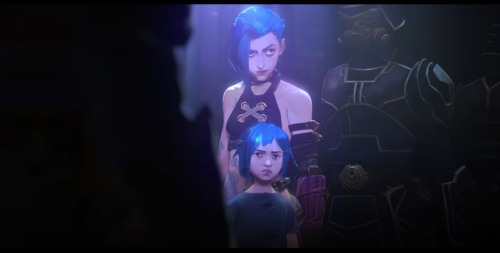
Okay, let's look at some positions on the various ends of the spectrum.
Jinx as a trans metaphor
I know that independant of what the writers intended, some aspects of the story deeply resonanted with people was a trans metaphor. Where Jinx is the real personality and Vi is kind of being a horrible sister by not seeing/understanding that and trying to force Jinx into being powder again.
I think this view doesn't really fit with season 2 anymore, where we see Jinx also not liking Jinx anymore (declaring that Jinx is dead) and aspects of Powder seemingly emerging precisely in moments where she's happy. (Plus quotes from Christian Linke suggesting that Vi is not categorically wrong in looking for Powder, she's just not particularly good at it)
[in case it isn't obvious, everybody can always take real meaning from art, whether the author intended it or not, this is more whether we can expect the show or the writers to see the metaphor through to the end because they are working off the same metaphor]
The locked away princess / the brainwashing hypothesis
On the other extreme is Vi's point of view which blames the existance of Jinx fully on Silco, that he brainwashed Powder and that is she just removes Jinx from Silco's influence, Powder can come back and they can make up.
I for one thought that this approach was quite flawed and that Powder's relationship with Jinx and vice versa was always more complex and layered than that. (For example we see her have hallucinations on the bridge, long before Silco took her in, and I always thought the Enemy music video was quite representative of how Jinx is both something Powder feels but it also appeals to her because Jinx is cooler/stronger)
Jinx as a mental illness
Another take was that Jinx is the expression of Powder's mental illness and such as will always be a part of her, that it's a part that maybe can be managed, but that can't necessarily be healed.
Jinx as a coping mechanism
The twin of this approach is that Jinx is a coping mechanism for Powder, when she can't handle the guilt or the trauma. And that here in theory there would be scenarios where let's say she learned to deal with her guilt in a more organic way then she could let go of Jinx. (respectively in a world without trauma Powder would just be Powder and there would never be a need for Jinx)
I would argue that there are vibes of this in Jinx and Isha, that Jinx is almost getting to relive some of the childhood she lost out on or is getting a chance to heal her inner child.
This way of viewing Jinx is also has interesting implications about SIlco. If we presume that SIlco saw himself in Powder, or that least tried to show off himself by example: Silco is somebody who was fundamentally convinced that reacting to trauma/betrayal with a hardened personality was the right choice.
So if Jinx's story seems to sort of disagree and say that she would have been happier if she had found other ways of coping that makes one wonder if it's the for Silco? If the path he chose was the wrong one, not just for Jinx, but maybe for himself too?
(and again: Silco is a character who is heavily defined by "the ends justify the means", so him being wrong in his intuitions and take on the world has double the implications for him and is pretty uncomfortable for people who agree with his point of view or were persuaded by his point of view in regards to Jinx [ie Vi is a shitty sister and yes it was kind of shitty for Silco to lie to Jinx but his interest in keeping Vi away is legit because Vi can't accept Jinx; or yes he did immoral things, but he ultimately was right to want to make Jinx stronger)
[for what it's worth, the "Jinx is healing her inner child through Isha" also has implications that maybe her childhood with Silco didn't succeed in doing that for her]
Jinx and Powder both as aspects of her
Basically both Jinx and Powder are natural parts of her and the "happy ending" would be for her to accept both and create a synergy (and there is both her disliking Powder because she saw Powder as weak and Jinx being disliked for her violence or lack of control).
And I guess there could be variations of which part contributes more in the end.
Evolution or Powder and Jinx both are just stepping stones
Another take could be that we are always changing in life and that we could take Jinx's "Jinx is dead" as face value and that the natural, happy for her (if she isn't pulled back by tragedy) would be to move from one personality to the next and the next stage would be yet again something new/a third option.
Jinx as a superhero metaphor
Something that occured to me when in the preview it seems like Vi is begging Jinx to join the fight. And we have seen shimmered up Jinx being a formidable fighter.
A frequent story we have seen in modern media is the superhero. Of a person who takes on a certain identity to a fighter. There are different version, from the superpower and superhero identity being a burden and a trauma (like Hulk), a temptation, to the civillian identity being something they take on only occasionally get some peace.
Here the proposition would be something like Jinx being able to switch between Jinx and not-Jinx more at will and bringing Jinx out if she needs to fight, rather than spending all her time in the Jinx identity.
Jinx as a metaphor for Vi's guilt or you can't undo the past
Vi caused the creation of Jinx by hitting her and/or not taking care of her. She cannot accept Jinx because she is struggling with her own guilt and wishes to undo her own actions. However undoing your own actions is impossible. The "right way" to act in this metaphor would be to learn to suck it up, handle her guilt better, accept that Powder is gone.
The premise here is that Jinx really is her own person, responsible for her own actions (and can be judged by them, rather than Silco or Vi being at fault), the change is irreversible. Vi should move on from her guilt, accept that she can't fix Jinx and instead try to do better with other people in the future.
Jinx as a metaphor for Vi's inability to move forward and accept change
Vi is haunted by guilt and be ause she was thrown in prison and robbed of her childhood she is sort of stuck in arrested development and because of that she struggles with change.
The healthy way here would be for Vi to be more accepting of change but see that some things stay the same even as things transform (like Vander being inside of Warwick).
For her to slowly form a new bond with Jinx so they can move forward together with a new, changed relationship.
(this could fit with what Christian says about Vi having to come see Powder as that and her relationship with Jinx actually improves after that, but at the same time, it maybe improves because she sees Jinx interacting with mini!Powder, aka Isha)
Jinx as a metaphor for Vi's judgementalism or Jinx as a metaphor for violent revolution
The read here is roughly like this: Vi is like Vander, a judgement, holier than though person, who judges Jinx and Silco for being immoral and/or violent and/or endangering people. (While being more accepting of for example Caitlyn or Jayce doing violence) When Jinx didn't want to be Jinx anymore, she also resisted the call of the revolution.
The good option here would be for Vi to stop being judgement or else she'll be washed away by the revoltion.
The downside I see here to me it doesn't really feel like Vi's problem was so much violence? And more not being able to recognize her sister. And when Jinx was resisting the call, it didn't really feel like she was rejecting violence, she was just having a fun time with Isha and wanted to focus on that?
I also have my doubt that Vi would embrace the revolution because I count on her sticking with Cait.
The revolution is bad actually
Like above, except Vi is actually right to judge the violent revolution negatively and the "good ending" would be either Vi defeating the revolution or for Jinx and the revoltion to realize they have to lay down their arms.
(again: same points about the theme of violence not feeling as present to me causally. Yes, Jinx doesn't do much violence while with Isha but it didn't feel like her guilt over doing violence played that much of a factor?, I dunno it's late and I'm not making that much sense)
Jinx as a metaphor Zaun
Jinx is chaotic, violent, creative and hurt by Piltover just like Zaun. Her and Zaun fates are linked and mirror each other. Both Zaun and her will have the same ending (ie if Zaun goes free, so will Jinx).
The downside I see here that Jinx feels very self destructive to me, and I'm not sure I would necessarily describe Zaun that way? Like on one hand Zaun has some rather healthy communities like Ekko's, then the percentage of "issues caused directly by Piltover versus as a chain reaction" feels different to me between Zaun and Jinx to me.
And parental figures just play such a big role for Jinx while I don't get the same vibe from Zaun (yes one can also read Vander and Silco as the fathers of Zaun, but I guess to me it always felt like Zaun was around for a long time and Vander and Silco tried to liberate it more than they were creating it from scratch (again, probably going more with League lore here rather than stuff that has been explicitly covered by the show)).

There's probably more I'm forgetting about. Anyway, we'll see soon enough which shape Jinx will take and whether she is happy or sad, victorious or punished with it.
8 notes
·
View notes
Text
Research - What makes a character design sheet
A character design sheet is a visualisation of a character's appearance, accessories, poses and other details that is mainly used in animation and videogames. This is an effective way to convey the character's personality and physical traits, as well as understand how to draw the character efficiently when doing something like animating the character or drawing them in different angles and positions.
There are some fundamental features that go in a design sheet:
Character's name
Different angles - such as front, side, back
Different facial expressions
Colour palettes
Notable features, accessories, etc
These main features help make a design sheet both helpful and appealing, and can make it easier for yourself or others to draw the characters in different scenarios.
I have picked out some examples of character design sheets I like, as well as some that I think fit my style of drawing.


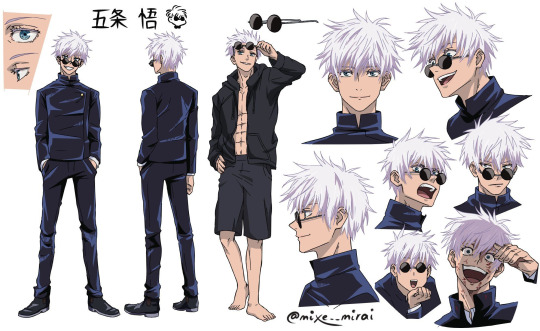

Pokemon
Pokemon's art style is one I find super appealing to look at, as it has a lot of features which make it look cute and lively. The most prominent feature being some of the character's eyes, as they can be large and expressive, which means they are able to show off more emotions.
The character design sheets are also very detailed, providing a lot of useful information about how each character should look at all angles, as well as extra features like arm or head accessories, etc.


0 notes
Text
It’s 12 Nov 2024. You know how stupid I can be, right? Well, here’s one: I just this second realized that torture is twisting, which is torsion, which is pairing over a certain End, which is HG. And in this, I’m Observer, like watching someone with battle ropes in a mirror except it’s someone else rolling the ropes through to you, one over the other, so they cross, so they change shapes and amplitudes.
Lost the thread. I was sitting outside listening to the traffic whine while my tea steeped for as long as I could take the chill. Is that a peculiar sentence? It has an unusual rhythm which I like, very much like when two hands combine to play a melody which changes in both hands.
I just got the Roman mental trick for generating such lengthy descriptives. It’s the translation of the Observer telling the story, meaning it’s fundamental in the mental shift involved in storytelling. This is hard to describe. I’m trying to get out the idea that storytelling counts along a composition axis - oh, and here is where I go wrong; I think xK and yK when I should be thinking about szK, where the notation means s is orthogonal to the count (so zsK is when movement is in sK directions. Both can be entirely positive: just draw the axis line, like in Hexagonal because that’s what we’re describing again, and we begin at the center End and we see choice into gsSpace as a cube, meaning as the corner of a cube. How did that show up? I’m confused. I know it’s what we saw, but we begin with Triangular, and we draw sK and zK as yK and xK by tilting the image. I remember doing that before, more than once.
As I think about it, that becomes the upper halfplane, which we can tilt to be forward and backwards along the standard xK.
So, the idea is the Romans developed or rather refined a method of speaking in which you become the storyteller and you make up stuff, but something important is left out, like the identity of the speaker or the action. Pending identity in those ways means you describe things which are parts of a journey, places you stop on the way, and that is easier because you can connect to all the stories about that type of person or place or element of character, all those previously worked out bits that you can assemble more easily, with greater fluidity because they’re attached without a label because when labeled comparisons automatically generate and those will deflate or otherwise counterbalance the exaggerations or frankly any distortion necessary to make the story sparkle. I’m not saying this is unique to Rome, but it helps me understand why their thought processes can seem so modern.
The idea behind that is hard to dig out. The ability to be blunt is in a 1-0Segment with the ability to avoid being blunt, so there’s a pairing of the ability to describe in the closely linked abstract. That goes from abstract to concrete so there’s this place where the Attachment may be the identity of the person or something else which Attaches, like a sudden change in the direction implied, like by negation. As in, heaps of praise and then he is not or he doesn’t deserve. That organizes events over time as they specifically relate to real Things. So that’s specification in action in Latin and in Roman thought.
An implication is the barbarians didn’t reduce the metaphors to the concrete. So the concept of we’re going to kill you all if you don’t do what we say is taken as bravado rather than reality. Same as when Hitler took power and people said it can’t really be that bad? In some ways. Both are failures to reduce context, but the latter was truly hard to believe. Don’t know about the former.
But the idea is appealing because there’s a gap between a metaphoric based society and the Romans, with their ability to link abstraction and concreteness. As in the concrete, which they must have observed and industrialized using that linkage. Which is Observer and Actor, right? It must be. Abstraction means you look at it as separate while concrete means you connect to see what has been identified. So we see Actor and Observer in language and culture.
I’m going to the gym. Need to take a break. And to be blunt, the sexual need is really intense and I need to put strain on my body.
0 notes
Note
Favorite relationship in the franchise?
Sonamy.
sonamy sonamy sonamy.
I’m surprised this is an ask, tbh. Nothing against you, Anon—I just feel like I never shut up about them lol. My love for their love is endless.
These are my general, summarized thoughts, but I’ll link some of my other posts, too!
——
Sonamy works because Sonic and Amy have a few fundamental aspects going for them:
They each offer the other something that supplements them: Sonic gives Amy encouragement and inspiration to use her skills for good (emotion, love, and physical prowess), as well as opportunities to actually use her skills with his adventures (and her own). Conversely, Amy gives Sonic a safe place to land and to engage with his emotions, something he struggles immensely with. In short, Amy unlocks a lot of Sonic's emotions and helps him feel and navigate them. No other character makes Sonic react with such a wide range of emotions, and no other character allows Sonic to be fully and completely himself--with and without the hero mask.
The relationship (and its romantic qualities) is extremely subtle in nature, which adds to its appeal and sense of depth: I can only truly get behind ships when they go beyond just potential--I need to see it supported by canon, and Sonamy is in the best ways. Sonic and Amy understand each other on such an intricate level that they don't often need to use words to communicate. There's an air of connection that floats between them that, combined with their history, shows exactly what they're thinking--they never state the obvious because they don't need to, which makes the moments where they do state the obvious a lot more impactful. Words aren't wasted between them. Their relationship is described by canon sources (like Sonic Channel, for instance) as nuanced, complicated, and multi-faceted--what looks from the outside as something confusing or otherwise questionable is bathed in layers of meaning for the hedgehogs. Their love is visible (especially from Amy), but the depths of it are private, intimate, and expansive--and that makes it so special.
They have a lot in common, which makes their lifestyles compatible long-term, but they're also not afraid of each other: they both hate boredom and actively seek out adventure (alone and together), they're highly emotionally charged and passionate (positive and negative emotions), and have strong desires for justice and good in the world. At the same time, though, they're not blinded by their affections--Sonic stands up to Amy when he needs to (most recently in Frontiers), and Amy definitely stands up to Sonic when she needs to. In fact, going back to unlocking emotions, Amy is by far the character with the most success in cutting through Sonic's stubbornness and getting him to reconsider something. This willingness to communicate on both fronts is extremely healthy and good for both of them.
——
(Sonic Frontiers Spoilers^^^)
I also adore knuxouge
And shadamy is a guilty pleasure occasionally
#sonic the hedgehog#amy rose#sonamy#give me your sonic asks!#molina asks#molinaskies#my babies#kindred spirits#poetry in motion
149 notes
·
View notes
Text
I think irl and in canon ppl are baffled by what Bugs sees in Daffy, as if Daffy’s Mr. Wrong.
But…. It’s kinda switched once you think about it??
Yes, Daffy’s flaws tend to outshine his better qualities, but his friendliness and cheerfulness is overlooked. Like, he’s best friends with one of the most temperamental yet patient everyman there is! Daffy’s selfish, but he knows how to be part of a team. In both the meta and literal sense, he has the unparalleled ability to slips into various roles to accommodate a dynamic, and still be true to himself (Duck Twacy, Duck Dogers, Porky’s Husband friend or enemy, Danny Boy) His affectionate gestures are quite sincere compared to the rest of the tune cast. (and again, as a rule of thumb any sincerity is offset by a gag, so take that with a grain of salt) Bugs on the other hand, operates in a way that teamwork or camaraderie is out of the picture. Without trying, he dominates. He’s unreachable in ways that make it hard to be friendly with him, or engage in conversation without him (somehow) talking down to an audience. Have you noticed he has that air about him?? Even with his peers, he’s always on a pedestal. And Bugs has never been cast as anyone but himself… he’s inflexible.
Bugs can be at once, affectionate and manipulative. He’s very hard to read, and his few positive relationships make it unclear when he’s being honest or not. That’s not to say Bugs can’t be kind, generous or polite, I think compared to Daffy (and most tunes) he exhibits better etiquette. He’s more charming by design. Daffy, for better or worse, has no filter for his motivations or deeper emotions. He’s supposed to be relatable in that sense.
So what does Daffy see in Bugs?? Longtime WB producer and director Tony Cervone has stated multiple times that Bugs finds Daffy entertaining, his unpredictability fascinates him. (and further cements the insinuation that team ups have been initiated by Bugs, i.e, he pursues)
So, I think for Daffy, ironically, it’s complicated. It seems what draws him to Bugs, are also what he despises him for. Ok, the elephant in the room: Bugs models the qualities Daffy lacks. Stardom, adulation, effortless appeal, knowing what to say and when (tact is something Daffy desperately needs). It’s very easy to look up to Bugs, and as I said a couple posts ago, he once and (kinda??) still does. But, Daffy also has the hidden ability to being people to his level, and after spending enough time around Bugs I think he recognizes he’s not as untouchable as he (and his audience) makes himself out to be. Bugs is the type of person who masks imperfection well. Fortunately, Daffy’s drawn to mystery (in canon and in his roles in shorts), so I can see him quietly trying to investigate the parts of Bugs that never reaches public eyes, like a case study. So, is this a positive or negative draw?? it depends on Bugs’ attitude and Daffy’s mood. I guess it can be said that the fascination is mutual, Bugs is entertained by Daffy and Bugs gets under Daffy’s skin.
And of course, we CAN’T ignore the surface level of Bugs’ appeal to Daffy. Bugs’ generosity gives Daffy many opportunities to exercise his materialism and lavish lifestyle. He gets free dinners, Bugs covers all their vacations, and (a big plus for Daffy) he doesn’t mind relinquishing treasures and fortune when they come across it. Don’t call Daffy a gold digger don’t call Daffy a gold digger don’t
So yeah, I went off on a tangent but I hope I cleared up the misconception that Daffy’s Mr. Wrong, both of them—Bugs even more so— are the ‘odd’ choice.
This clear up doesn’t help paint their relationship in a healthy light. There’s ulterior motives and mutual selfishness, but I believe there’s never a fundamental misunderstanding of the other. If they were both more introspective, they’d find to their horror no one understands them the way they do each other. For two stars with excruciatingly large egos, that’s probably the best and worst quality of their weird relationship, ‘being known’, haha.
#bugs bunny#daffy duck#looney tunes#baffy#kinda??#just kidding yeah it is lmao#you sittin there yakkin (talk tag)#once again i don’t have a point to make i just fuckign ramble like a madwoman#After I wrote that Daffpork joke I kinda got another idea to expand on their relationship#I misread daffpork due to obvious biases lmaooo#if Tashlin in an interview recognizes that giving porky a gf is pointless bc he already has daffy#(‘ i can’t make a girl duck for him’ was his choice of words)#then there’s BIG stuff i’m missing there#i could also turn it around and make it prime turmoil for baffy ehehehehehee#imagine… pork and daff healthy and together and Bugs is quietly fuming that for ONCE he doesn’t get what he wants#delicious. scrumptious. decadent#online shopping to fill a void (analysis)
798 notes
·
View notes
Note
Girl, so, I am also a lover of all things gay history and I saw your post talking about how Sappho was a lesbian. And while I totally agree, there is another poem of hers that people use to claim she is bisexual entitled "Of course I love you", what are your thoughts about it?
Ah, thank you for bringing this up! This requires a bit of a lengthy grammar dive, so I’m adding a cut:
It took me a while to find which poem you meant; I'm used to refering to them by number (the 'titles' in English are just the first line of the poem), and at first I could only find this one in English with no number. It turns out that the 'title' of this one is hard to connect to a numbered poem because it's actually two poems mushed together by a translator who thought they might be related (so the starting line/title 'Of course I love you' is a theory that many people reject):

^ This review provides the Edmonds translation as a contrast to Barnard's, and you can see one translates it as "I cannot submit to live with one that is younger than I" and the other translates it as "I couldn't stand it to live with a young man, I being older". For another conrasting example, Russell translates this part as “I will not suffer to live with you, as an old woman with a young man.” If you're trying to use this poem to talk about ancient Greek attitudes towards marriage, for example, it makes a big difference whether Sappho is saying "stand it" or "submit to it" or “suffer it” or something else, so it's necessary to go directly to the Greek text and understand Sappho's own word choice rather than interpreting the word choices of the modern translators.
Part of the difficulty with ‘going directly to the Greek text’ for Sappho is that the text only survives in fragments, multiple versions of some of the poems survive, and she wrote in a very specific dialect of ancient Greek with lots of grammatical irregularities.
This particular fragment of Sappho (numbered: Lobel-Page fr. 121; Cox 72) has all of these difficulties:
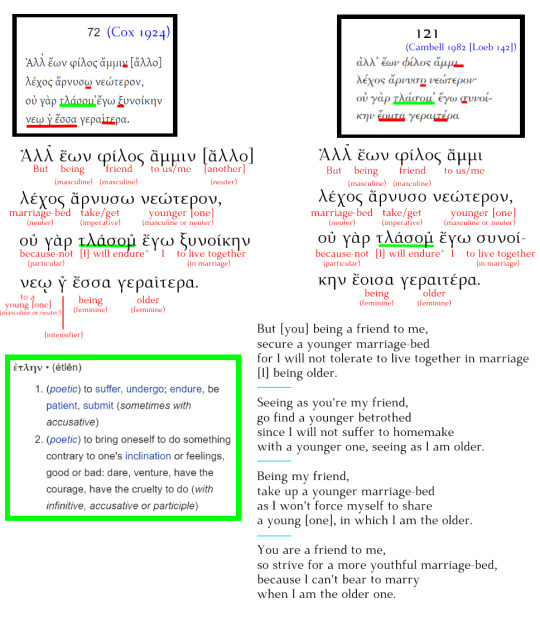
I know this is an eyeful, but bear with me. At the top in the two black boxes, there are two different versions of the Greek text (Cox 1924 on the left, Campbell 1982 on the right; the differences are underlined in red). Underneath each box, I’ve made the different Greek texts bigger and put the English meaning in red underneath each Greek word. Some words have multiple meanings; as an example, I underlined one in green and put its many meanings in the green box at the bottom left. On the bottom right, I’ve done four different English translations of the poem; when you compare them to the red word-by-word English vocab, you can see that all of these translations had to massage the Greek meaning to make it make sense in English, but fundamentally they’re all conveying the same thing.
In both versions of the Greek, Sappho is talking to a male addressee (we can tell because the word φίλος, ‘friend’, is masculine). Typically, this poem is interpreted as Sappho rejecting this guy's marriage proposal and telling him it’s because he’s younger than her. Even just from that, it doesn’t make sense to use this as proof of Sappho’s bisexuality -- all she really says here is that she doesn’t want to marry this guy and she doesn’t want to marry anyone younger than her. She says nothing about who she would want to marry. Even if the Greek very clearly said 'young man' in the last line, it would still be describing someone she wouldn't marry. Some people infer Sappho's bisexuality from this because she says that his age is the reason for her rejection, not his sex. However, that's not the same as saying age was the only reason; age was just the justification she gave here in a short fragmentary poem. It looks like she's letting him down gently, calling him a friend, appealing to his fondness for her in order to convince him to pursue someone else, citing his youth (a positive trait that won't insult him and isn't criticism) as why she wouldn't marry anyone his age (so it's not personal). The core gist of the poem is Sappho saying politely that she's too old to be interested in a young man like him, or any young man for that matter, so he should go off and find some nice young woman to consummate his marriage with, because she herself could never suffer doing that with a man... because she's older, of course 👀.
The hypothetical 'young man' (again, whom she says she wouldn't marry) only appears in the version of the Greek I've taken from Cox 1924. The important word here is νεῳ (literally '[with a] young [one]’). νέος/νέα/νέον (masculine/feminine/neuter) is an adjective meaning 'young' or 'new'. Adjectives can usually stand alone in Greek because their number and gender can imply a noun without having to say it; as an example in English, think about The Good, The Bad, and The Ugly (you don't need to say 'the good [men, people, guys, characters, cowboys]' or whatever to know that they are using these adjectives to mean nouns). Greek adjectives and nouns change the way they look depending on their gender, number, and 'case' (what their role in the sentence is), so using adjectives to act as nouns is a bit clearer: for example, ἀνήρ καλός can mean 'handsome man' but just saying the masculine adjective καλός means 'handsome [male thing]', thus implying 'handsome [man]' on its own without needing ἀνήρ.
Here are all the singular forms for νέος:
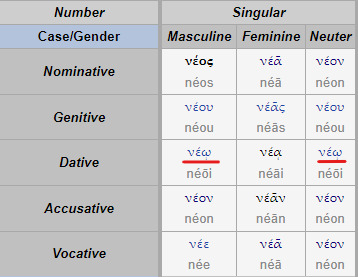
As you can see, νεῳ could be either singular masculine dative or singular neuter dative; the forms of the word look the same in this case. In the previous image, I offered four translations of the poem; translations 2 and 3 of those four include the word νεῳ and show how it could be translated as 'young partner', 'young man (masculine)', 'young marriage-bed (neuter)', 'young one', or just generally vaguely 'young [thing]'. If Sappho had instead used νέᾳ here to specify that she didn't want to marry a young woman, it would screw up the connection between this clause and the first clause; it'd be like saying "I won't marry you (male) because I don't want to marry a younger woman".
Instead, she either says "I will not subject myself (οὐ τλάσομ) to joining housholds (ξυνοίκην) with a young [man] (νεῳ, masculine)" (the more likely version) or "I will not subject myself (οὐ τλάσομ) to joining households (ξυνοίκην) with a young/new [marriage-bed] (νεῳ, neuter)" (the less likely version). In the less likely version, the neuter νεῳ invokes the most recent neuter noun, which here is λέχος (marriage-bed); this would mean that she tells him to find a newer marriage bed (λέχος νεώτερον), then tells him she doesn't want a new one [marriage bed] (νεῳ [λέχει]). Either way, there's nothing here that indicates Sappho's romantic interest in men other than that she might have only said she would hate to marry a young man.
In the other version of the Greek, the Campbell 1982 one on the right side of the earlier image, you can see that the final line does not even have the word νεῳ; without that word, Sappho just says that she doesn't want to get married while being the older partner. I'm also more inclined to trust this version of the Greek text because it's the one the Loeb Library chose for its edition, but since the other version has νεῳ and that's relevant to your ask, I figured I'd just go through both like this. I'm sure there are also other versions of the Greek text with slight tweaks and variations, but νεῳ is the only variation I know about that could conceivably be used for a bisexuality argument.
Anyway, hope that answers your question enough. Happy to field follow-ups if you have 'em :)
72 notes
·
View notes
Text
it's late for me too :pensive: but i really wanted to type this out while it was still mostly fresh to me (and this is draft 2, since i got lost in the weeds with draft 1)
i sort of agree with bowser, though i'm not certain if it's for the same reasons, and i'll try to explain them. i will ALSO disclose, because it is somewhat important to the understanding of my viewpoint, that when i get into a media, often i am there for a character, one character in particular, and they are My Favorite. (not that they Must Do No Wrong Ever, but that i'm rooting for them at all times, and like them as they've already been) so if that outright bias means my viewpoint isn't valuable to you, feel free to write most of it off! i hope some of my points still bring something for the table to you - draft 2 here is constructed with that fundamental difference in how we enjoy a media held more in mind, trying to make more neutral points or explain what is my specific preference, acknowledging the room for different preferences.
i'm fairly sure bowser was referring to jewel and belle's interactions with tangle as 'interesting' not as in 'thought-provoking' or 'unique' necessarily, but mostly as 'capturing/holding interest' or 'sparking enjoyment/appeal', which i agree with because they are fun to see interact with tangle! jewel with tangle before she lead the restoration was very fun, seeing a very non-combatant character close friends with someone who loves being in the thick of it, and exposing that she has a funny wry/dry sense of humor ("It was hiding in front of a lightpost, clearly it was out to get you."). i can agree that it's difficult placing them in a storyline together because their avenues of work diverge - jewel is very much not an active combatant or participant in many things, by her own will, and tangle is the complete opposite, so unless you create a brains+brawns sort of combo where the point is one of them doesn't fight and the other does, they won't really work together. but, if one were to get around that, i LOVE seeing tangle and jewel together, whenever it's fit in.
belle's interactions with tangle expose positive sides to both characters, in a way. tangle encourages belle, and belle winds up enabling tangle to break out and do something to help out, instead of doing (likely very important and useful, honestly! but very very boring to tangle-) stockroom duties. they didn't necessarily form a deep connection, unless you count tangle's reassurance to belle about her father (whom tangle never met), but it did interest me to see tangle paired with someone new, and which sides of them fired each other up further, and which sides varied. further seeing tangle with both belle and jewel on the camping trip was fun, even if true interactions between them were sparser :)
and i do agree that both of those characters are pushovers - that tangle only looks quite as brash and fiery as she does because she's often next to them, or intentionally taking a back- or side-seat to sonic and his group. it is interesting to see how tangle isn't actually THAT opinionated or forceful next to someone who definitely can be, and to have that be a conflict/challenge that tangle either fails/cedes to, or overcomes!
i like your in-universe point that lanolin had expectations, and they were NOT accurate to how tangle and whisper ended up being. then putting herself in charge of the two to manage them and make sure she can expect how things will turn out makes sense - she can only strategize if the knows the pieces on the board, and that means either getting tangle and whisper to follow orders to a T, or spending way more time with each other.
however, out-of-universe, it is less fun for me to see characters i like and their dynamic being prodded apart and broken. this is the unique privilege of the comic-original characters - without the mandates SEGA sends down for sonic and crew, you have room to change and worsen/develop/build relationships between everyone about as freely as you want. to my perspective, it's like a diner i go to has removed my favorite item from their menu. if i go there, i can't really get my favorite - i've got to get my second favorite, or settle for something lower on the list. maybe there was a good reason they had to take it off, or maybe i was the only one buying it and they couldn't keep it - regardless, it just leaves me disappointed, unless second-favorite is nice enough. in this analogy, you likely go to the diner because every one of their dishes is high-quality, or at least good - you might have a favorite, but you'll eat the daily special to have the variety, or see what the chef recommends, and if the menu changes you'll still enjoy most of it.
it also is really unfair and unfortunate all around that one of your favorites is getting attacked so often, because a lot of it IS down to personal preference being janked against by how they've implemented lanolin and the waves around that whole point of the comic.
i don't want to sound like i'm saying there's no way lanolin can be a good character/addition, or like there is no point to her charactertype being added in - and i'm certain you have reasonable points on the benefits she brings in that could appeal to me regardless of personal preference, so i'd like to hear them if you want to engage further! you like lanolin and i respect that, and i automatically like her more when i see other people liking her :] my own perspective is that she's fine, but i don't know if i'd agree she's best exactly where she is now as opposed to a different execution or introduction -- though i can't articulate exactly what that is yet (it's 2:40am :,D)
added edit note: i also don't agree that the place for tangle at all is in a stealth mission sort of team; pairing her with whisper to necessitate tangle taking part in that is one thing, but then doubling down with lanolin is setting tangle in place in the exact spot my favorite traits of hers are least useful/applicable/preservable, so i wonder if some of this conversation is a foregone conclusion knowing that angle
be honest. why do you dislike lanolin. ill tell you why youre wrong of course but i wanna know
20 notes
·
View notes
Note
what exactly is middlebrow and why is it the enemy???
--
In between highbrow and lowbrow. >;D
Okay, okay, more specifically, this part of the wikipedia article is relevant:
Woolf criticizes middlebrows as petty purveyors of highbrow cultures for their own shallow benefit. Rather than selecting books for their intrinsic cultural value, middlebrow people select and read what they are told is best. Middlebrows are concerned with how what they do makes them appear, unlike highbrows, the avant-garde men and women who act according to their indelible commitment to beauty, value, art, form, and integrity. Woolf said that, "We highbrows read what we like and do what we like and praise what we like". Likewise, a lowbrow is devoted to a singular interest, a person "of thoroughbred vitality who rides his body in pursuit of a living at a gallop across life"; and, therefore, the lowbrow are equally worthy of reverence, as they, too, are living for what they intrinsically know as valuable.
Instead of such freedom, the middlebrows are "betwixt and between", which Woolf classifies as "in pursuit of no single object, neither Art itself nor life itself, but both mixed indistinguishably, and rather nastily, with money, fame, power, or prestige." Their value system rewards quick gains through literature already designated as 'Classic' and 'Great', never of their own choosing, because "to buy living art requires living taste." The middlebrow are meretricious—which is much less demanding than authenticity.
Which admittedly sounds like a lot of pretentious waffle and can certainly become blind snobbery if one is too hardline about it, but I think there's the seed of an interesting idea there.
Basically, in that other post you're asking about, I was positing things like unrestrained idfic as "lowbrow". Tentacle porn and a/b/o and intensely melodramatic hurt/comfort appeal to our most fundamental instincts. We love them because BRAIN SAYS YES. And that's great. Haters can shut the fuck up.
When people in fandom call their stuff "trash" with a grin on their faces, they're talking about lowbrow art.
AO3 was made to defend a lot of lowbrow art from people who think it's In Poor Taste.
Now, "highbrow" sometimes gets used for pretentious assholes, but in a more positive sense, I was using it for cultural products that require a lot of specialized skill to make but also to appreciate. Michel Foucault was a philosopher. The sort of people who sit around reading philosophy for fun are highbrow. Not people who read it because they have to. Not ones who think it makes them look good. Ones who enjoy it.
Middlebrow is something in the middle that is neither arcane and inaccessible philosophy nor fun idfic. Depending on who is doing the analysis, it might be intellectual-for-the-masses work like Breaking Bad (not inherently a bad thing) or it might be social climbing faker bullshit like reading the Great Books because you're a snob and not because you understand their literary merit.
Basically, saying that the only true enemy is the middlebrow is saying something like:
Let your freak flag fly.
Live your truth.
Whether you want to talk about French philosophers or a/b/o, be you and don't apologize. The middle way is trying to be mainstream without being crass. It's the pearl clutchers who want fic to be respected and are happy to throw the perverts under the bus to achieve that. It's the people who are threatened by big words because they aspire to intellectualism without understanding or liking it genuinely. It's normative blandness at the expense of exploration and individual aesthetics.
And that's why it's both hilarious and ultimately unsurprising to find someone in my replies using Foucault to talk about fandom bullshit.
481 notes
·
View notes
Text
i dunno, like, something I ended up thinking about a lot while moving is the disparate place that femboys and trans women hold in consciousness and affection. And I think a lot of it comes down to like, well, crossdressing is always inherently a performance to some degree, generally put on in a way to be entertaining. It's someone putting on a show, doing something that they ostensibly usually would not. So when I see outpouring of enthusiasm for crossdressers, femboys, drag queens, etc, I dunno, I generally don't feel particularly one way or another about how that compares to the relatively low position that trans women like me take up in society, or even in the queer community more specifically. Cause like... Being a trans woman isn't a performance, it's just something I am. Even if both exist in the broadest sense of ♂️➡️♀️ the two aren't directly comparable because entering into the performance space of crossdressing introduces a certain amount of structure for how to position yourself as viewer and performer because it is a show meant to be seen. There is no such structure to fall back on when looking at trans women because we're just living this, this is just regular life. Like if a crossdresser finds a way to give himself immaculate cleavage and wears something to really show it off, there's an implicit understanding that yeah, he probably did this as part of the show, specifically to be fun and flirty and entertaining. Therefore, there's a reasonably good chance that you won't be out of line if you stare or make comments. If a trans woman has some sweet honkers and is wearing something low cut, you fundamentally cannot make those same assumptions. Even if she's a performer of some kind, her being pretty or wearing flirty clothing isn't inherently a performance that can be assumed to be inviting comment in the same way that crossdressing is.
A performance done to whip up enthusiasm and appeal to the audience is always going to give people a way to be excited and gush about that excitement in a way that something not inherently performative won't, in the same way that I'll enthusiastically trip over myself fawning over scantily clad girls on a float at pride, but restrain myself when beautiful women come into my workplace wearing low cut crop tops. There's no question a lot of transphobia to unpack with how trans women are perceived and treated AS performers and within anything where they are in the public eye. But like, I dunno, I think the basic surface level of femboys being "more popular" than trans women is in some ways kinda like how the popularity of WWE hasn't translated to people lending that same energy to taking local wrestling classes and studying an understanding of body mechanics, that Rhea Rhipley is more beloved than Cherise who works at your grocery store and teaches girls wrestling at summer camp. The two are just different, even if they exist in a similar field.
21 notes
·
View notes
Note
What do you think would happen if one of the Cullens realized they might also be "in love" with Bella during Twilight along side Ed. Mates be damned (not like their marriages are gonna last anyway), and everyone's on the table (just 1 love rival, not at the same time buuuuut could you imagine the chaos? *cough*). The usual Bella eaten/killed by Eddy boi is def on the table obvie, but like do you think there's a chance he might concede to one of his family (or just any other alternatives)? -Sw
Oh boy.
Why I Don’t Think This Is a Possibility
That said, I have to caveat that I don’t think this is a very likely path (sorry, I cannot resist).
It’s true I don’t think any of the Cullen relationships will last in the long term, but I also don’t think they’re inclined to cheat on one another or fall apart at a moment’s notice. They’ve made it this long, several decades, but more, none of them realizes anything is lacking from their respective relationship.
Carlisle and Esme are very devoted to one another and don’t realize they have fundamentally conflicting values. Jasper and Alice think they fulfil each other’s needs and don’t realize that they share nothing in common. Rosalie and Emmett’s is the healthiest relationship in the house but don’t see their major issues (Emmett doesn’t really support or understand Rosalie and Rosalie loves Emmett mostly for his love of her).
My point being, none of them are going to realize it’s not working out anytime soon. They’re going to need a catalyst, and per the end of Twilight, one is coming. Either a confrontation with the Volturi occurs, Renesmee decides to leave, the Cullen lifestyle changes, or things with Bella go awry. It can be any number of things, and it will happen given time, but at the start of Twilight we haven’t hit that point yet.
There’s also the fact that of the Cullens, only Edward would do this nonsense, and even for him it takes Bella’s delicious blood to grab his attention. When she was an ordinary human, he was not interested in the slightest, not even in her gift.
Each of the Cullens (Sans Alice and Esme) is completely baffled by Edward’s emotional whiplash and attachment to this human girl he doesn’t even know. Bella only becomes a vague concept to them when she enters as a serious fixture in Edward’s life, but even then, they really don’t know what to think.
No one in the family will do what Edward did in Twilight. Look at this girl they don’t even know and say “Ah, yes, I’m in love.”
Now, that out of the way, let’s play ball.
Alice
This actually will work out shockingly well if only because I suspect Alice will come up with the pragmatic solution of “sharing”.
First, Alice is by far the closest Cullen member to Edward. He holds her in high esteem, feels a strong sense of kinship with her, actually confides in her, and sees her as a very close friend. Edward looks up to Carlisle and adores Esme, but it’s not the same.
If Alice sees herself as getting together with Bella I don’t think she’d see this as mutually exclusive to Edward having Bella. Alice cares deeply for Edward’s happiness, far more than she does Bella’s general existence, and I think the idea of entering a joint marriage with Edward and Bella would be very appealing to her.
She’d have to ease Edward into it, of course, as he’d balk at the very idea of it, but I think he’d see it as a strengthening of his and Alice’s relationship as well as having the wonderful Bella. Better yet, Alice can be physical with Bella while Edward can go compose music about their love.
As it is this... This is kind of what happens in canon.
Alice tells Edward that not only is he in love with Bella, but that Bella is going to be her best friend, so he better not muck it up. She has to ease him into the idea of being in love with Bella throughout the first part of Twilight. Then, when the relationship is solidified, Alice is right there introducing herself as Bella’s new BFF. Bella’s friendship with Alice throughout the series is extremely homoerotic and I imagine it remains so after Breaking Dawn.
Edward is very pleased that Bella counts Alice as her best friend, Alice being far and away his favorite sibling and the one he approves of Bella spending time with (generally, when she’s not foiling his schemes).
I don’t think Alice and Bella will ever have sex, per se, but I imagine they remain quite physical with each other and Edward looks on with approval thinking to himself that this is how all female friendships should be.
And if Jasper has the nagging suspicion his wife is cheating on him then he’s not functioning quite well enough to put it into words just yet.
Carlisle
Edward would lose his mind.
First, Edward is very into Carlisle, and for all he insists his feelings are filial they sound remarkably romantic. I’d drop a quote, but it’s pretty much every time Edward thinks of Carlisle in Midnight Sun. More than that, Carlisle is the man Edward aspires to be, someone he sees as profoundly more good than he could ever hope to be.
Edward projects a very similar personality onto Bella herself.
So, I imagine if Carlisle sits Edward down and says, “Actually, Edward, I have fallen in love with this Bella” Edward feels very conflicting things all at once.
On the one hand, this means Esme/Carlisle is collapsing. Edward personally brought those two together and adores the idea of their relationship. Their relationship is what he hopes his and Bella’s will look like and is to him the married ideal of a perfect Mother and a perfect Father.
Carlisle/Esme alone falling apart would give him a complete existential crisis. That’s not allowed to happen.
And then that Carlisle wants Bella Swan for himself?! Edward would be faced with the immediate,horrifying, thought that for all Carlisle is a vampire he would be the perfect man for saint like Bella. Carlisle and Bella deserve one another, would be perfect together, and Edward should not begrudge them that.
On the other hand, Edward himself is in love with Bella, and while he thought he could nobly leave her, now he has to nobly stand to the side and watch as Carlsile and her marry. It’d be a very romantic and tragic thing to do, but there’s leaving Bella to her human life, and then watching her up front for the rest of eternity while bitterly hiding his feelings.
More, Carlisle will turn her. If Bella is his true love, then there’s no question of that. Edward’s seen where this goes with Emmett. He will destroy Bella Swan to be with her forever, and Edward will have to live with the shell of Bella Swan staring back at him, fucking his father, forever.
I imagine Edward desperately pretends to concede to Carlisle, to be happy for the pair of them, but as things progress and Bella’s permanent position in the family looks more and more likely, he loses his mind. He’ll snap and there is no telling what he might do.
My money’s on him mercy killing Bella while she’s still human behind Carlisle’s back. He’s sobbing while he does it, but he just can’t let Bella be tarnished by vampirism, and now he will carry this tragic, terrible, secret for the rest of time.
Whether Carlisle was going to turn her or not is up to debate. Given he turned none after Emmett, I think he learned his lesson from Rosalie and would be more than willing to let Bella go, even if he loves her, should it mean he would not force something she does not want and does not understand upon her.
That said, I think he’d never tell Edward his feelings for Bella, as that would ruin Edward’s fledgling relationship with the girl. This is Edward’s first brush with love and seems to be the only romantic love he’ll ever have. Edward has been so miserable for so long that Carlisle would easily give up his own happiness for Edward.
So, more likely, Twilight would happen anyway and Carlisle would spend the entire time being utterly miserable and pretending he’s perfectly fine. LOOK HOW HAPPY HE IS, ESME.
Emmett
Edward tattles to Rosalie immediately.
He loves Emmett, but he knows Emmett can’t possibly be serious about this, and more, fundamentally doesn’t understand how wonderful and amazing Bella is. He wants to turn her into a vampire, clearly, Emmett doesn’t know what’s best for the girl.
More, a man who would so easily break his marriage vows (even to Rosalie), does not deserve Bella Swan.
Edward watches Rosalie and Emmett’s marriage utterly disintegrate with a juice box filled with mountain lion blood and swoops in on Bella while Emmett is thoroughly distracted. Edward then gaslights Bella into believing Emmett is dangerous and despises her, making Emmett the new and improved Jasper.
Esme
Esme would never tell Edward or likely even realize her feelings for Bella herself. If she did though, she would give up the possibility of a future with Bella Swan in a heartbeat for Edward’s happiness, which means everything to her.
Esme will have no regrets, won’t even smile sadly at Bella, because she has Carlsile as her consolation prize and she gets to see the joy in both Bell and Edward’s faces which is far more important than having Bella to herself.
Esme would live vicariously through Bella and Edward’s relationship as well as the very existence of Renesmee.
Like Alice, this is one of those things that’s pretty much canon. I won’t say anything for Esme’s feelings, it’s more that Esme ships Bella with Edward (and mostly because Edward himself comes to obsess over her), but she does seem to vicariously get her joy through their nuclear family within the Cullen family.
Esme is a very strange person.
Jasper
Edward would attempt to murder Jasper or at least severely injure him. Jasper would be the ultimate threat to Bella, not even a man unworthy of her but not a man at all, and exactly what Edward needs to protect Bella against.
Alice tries to stop the fight, to no avail, and Edward will ultimately lose (despite all his confidence). I imagine Jasper doesn’t kill him, but tears apart his limbs, and uses Edward’s lack of mobility to kidnap and then turn Bella.
Bella has no idea what’s happening and the next thing she knows she’s a vampire and Jasper is telling her they have to leave the area (as he must now leave the coven).
Edward tries to track them down for the rest of eternity. He will get vengeance upon Jasper and save Bella this terrible demonic existence forced upon her. Of course, he ends up lost in Rio.
Rosalie
Edward would tell her that her feelings cannot possibly be real. Bella is a woman. More, Rosalie is unworthy of Bella in every possible regard, even more so than Edward himself.
Basically, Edward would lay into Rosalie in a way that he never has before with all of his venom. He will do everything he can to sabotage Bella’s opinion of Rosalie before Rosalie can even get a word in edgewise. He is successful at it due to Bella’s perilously low self esteem (much the reason he was successful with this endeavor in canon).
Rosalie and Edward get in a vicious fight and I imagine Rosalie eventually confronts Bella, making an opportunity to do so, and both warns her away from Edward, tells her everything, and offers to turn her despite Rosalie’s own mixed experiences.
Rosalie and Edward probably then fight and it quickly turns into something that’s very serious. If Edward wins, he murders Rosalie in the heat of the moment, and then leaves the coven in horror over what Carlisle must think of him now. If Rosalie wins... I don’t think she will, she cares for Edward far too much and would never truly be able to aim to kill or maim.
Edward disappears, drowning in his self hatred, and returns to find Bella Swan at some later date unable to resist the call of her scent. Depending where she is in her life, he likely murders her human husband if she has one and dvours her, as Alice prophesied so long ago.
#twilight#twilight meta#twilight headcanon#twilight renaissance#bella swan#edward cullen#anti edward cullen#edward/bella#anti edward/bella#carlisle/esme#anti carlisle/esme#alice/jasper#anti alice/jasper#alice cullen#anti alice cullen#alice/bella/edward#anti alice/edward/bella#jasper/bella#carlisle/bella#esme/bella#emmett/bella#rosalie/bella#jasper whitlock#rosalie hale#emmett cullen#carlisle cullen#esme cullen#twilight shipping#meta#shipping
249 notes
·
View notes
Text
A meta and analysis on Yagami Taichi
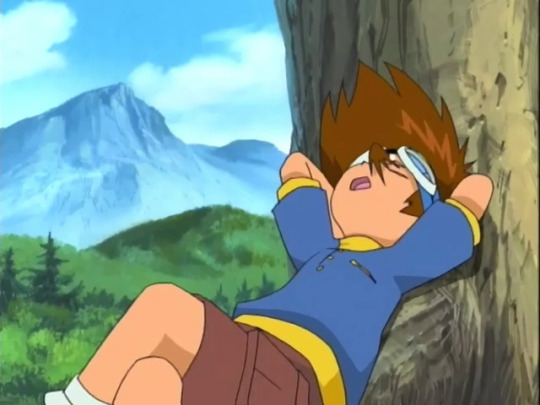
Being the face of Adventure and arguably the rest of the franchise, Taichi has the honor of being an important figure in the realm of shounen anime overall, which has the unfortunate side effect of very often being described with things that don’t actually match him at all -- the way people often talk about him (especially mainstream press) tends to portray him like a stereotypical shounen hero who charges aggressively into everything and is hot-blooded all of the time. That’s not...quite on the mark.
I think “impulsive” is certainly a correct way to describe him, but in a very different way than one might think -- and, in fact, Taichi is much more of a multifaceted character than he’s often pigeonholed as. How? Well, let’s talk about it!
Taichi in Adventure
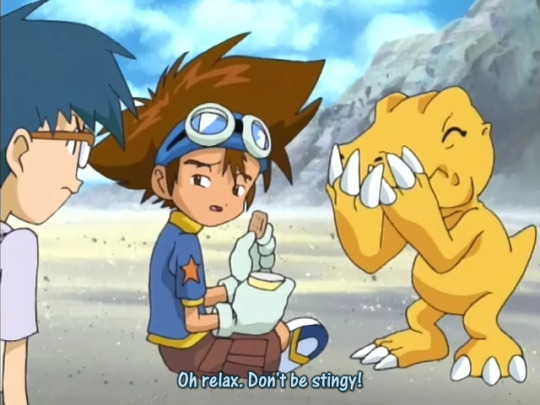
The main reason it’s probably incorrect to call Taichi “hot-blooded” by nature is that, in actuality, he is far more often too chill than otherwise. It’s not that he aggressively charges into everything without any rhyme or reason! Rather, it’s more like he takes everything very easily and has a “don’t worry about it!” attitude.
In fact, I think our friend the Animation Chronicle explains it better than I can:
If he doesn’t know/understand something, he acts while he tries to figure it out...
So in other words, rather than our conventional version of “being impulsive” meaning beelining to the most aggressive possible action, rather, it’s more like “the first thing that pops into his head” -- even if it’s a fairly easygoing or relatively harmless-seeming solution, he just goes for it because it sounds like it’ll work and he doesn’t see any reason why not.
That said, it’s also made abundantly clear by multiple sources that his ideas do come with some kind of consideration:
From the Animation Chronicle: ��He appears to move with reckless abandon, but he actually does take in his surroundings and he takes good care of his juniors in the soccer club.”
From the Adventure novels: “Taichi treated everyone without discrimination, as equals. That attitude of his didn’t change, even towards Koushiro. If Taichi hadn’t invited him, Koushiro was sure that he would have never gone to summer camp.”
Sora and Koushirou even back this up personally in Adventure episode 16, when Koushirou points out that Taichi had always been kind to his juniors, and Sora recalls an incident when he’d foregone an opportunity to score a goal because he’d known Sora was more likely to pull it off successfully.
So in other words, Taichi is, fundamentally speaking, not someone who does things for personal glory, but does want to work for other people’s sake. It’s just that, in trying to carry that out, he has a tendency to default to the first thing that pops into his head. Or in other words, Taichi’s primary way of thinking is “act first and figure out the details later” -- and this has both good and bad things about it.
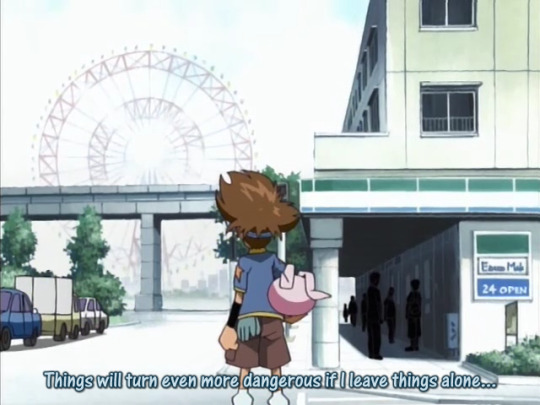
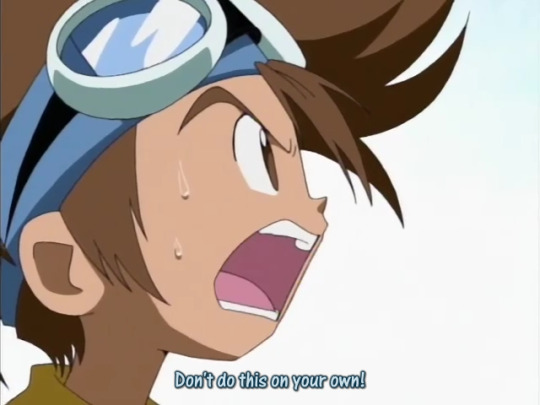
Firstly, the fact that Taichi has such an “action-first” philosophy means that he’s capable of acting very practically in situations when others would freeze up. A very good example of this is Adventure episode 21; after angsting for half an episode considering quitting the fighting and enjoying his life at home, the moment he realizes that everyone else will be in danger if he leaves everyone be, he immediately instinctively steps in to help everyone. It’s not necessarily that Taichi doesn’t feel the stress or danger of fighting; it’s just that when he sees the practical impact of people he cares about getting hurt in front of him, all bets are off, because he needs to help people now.
The second thing is that, as Koushirou points out, he’s very kind to his juniors, and people in general -- he doesn’t really pay much mind to things like seniority, and is more concerned about treating everyone in accordance to their practical capabilities. This means that he’s someone who has a certain sense of charisma, especially since he’s appreciative of people’s abilities.
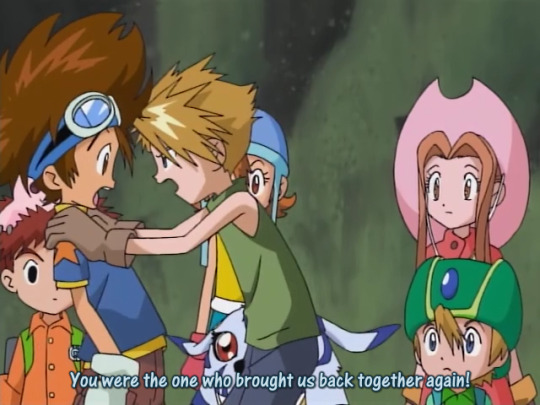
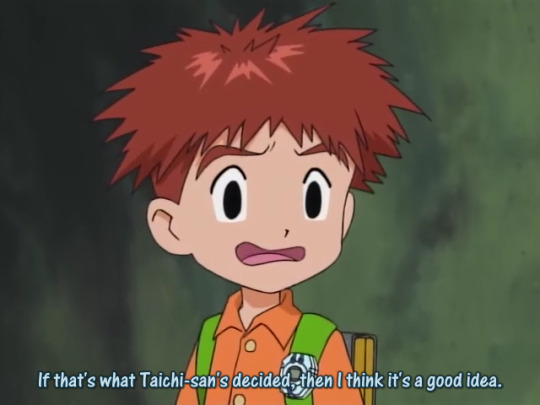
This is best indicated in Adventure episode 28, when two important things about Taichi are brought to the forefront:
Taichi’s natural charisma and ability to appeal to people makes him someone good at “bringing people together” -- indicated by the fact that the group hadn’t taken long to completely fall apart after he’d momentarily departed in Adventure episode 20, but came back together after he’d rallied them. The Adventure kids, coming from rather different social circles and backgrounds, were not originally the type to stay together or be particularly tight with each other by default, and so, during the first half of the series when they still had ways to go in terms of having any kind of meaningful bond with each other, they were unconsciously dependent on the charismatic Taichi to keep them together.
Taichi is a “natural leader” in every sense -- “leader” meaning not only someone who pushes people forward, but also someone who recognizes others’ abilities and is willing to delegate rather than trying to do everything by himself. This was briefly demonstrated in Sora’s Adventure episode 16 flashback when she remembers that Taichi willingly gave up the opportunity for a goal when he understood she could do it better (it’s reflected in his soccer position, too), but also here in Adventure episode 28, he gives the task of solving the card puzzle to Koushirou because he (correctly) determines that Koushirou, not himself, is best equipped to do the job. Also note that the episode makes clear that everyone agrees to it specifically because Taichi appointed him to the position -- much like how “understanding everyone’s abilities and delegating properly” is an important and necessary skill for a leader, everyone trusts Taichi to make that decision, and therefore trusts in Koushirou because he was appointed by said well-informed decision.
So those are the good things about him. What about the drawbacks?
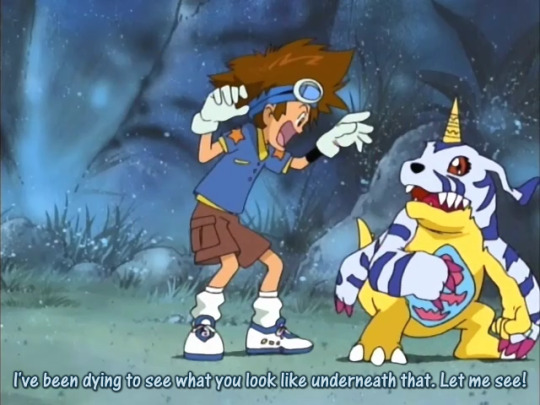
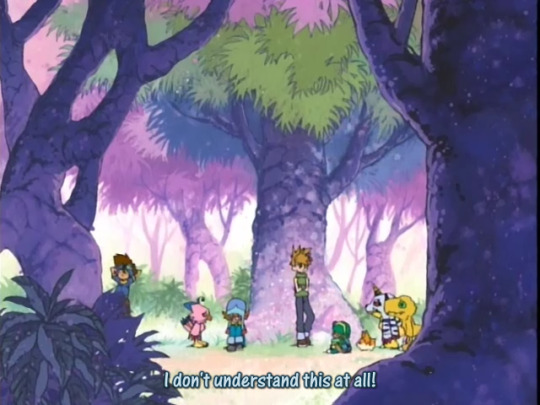
The first is that Taichi is, unfortunately, a little emotionally insensitive. He doesn’t mean badly, of course -- you can’t deny that his penchant for teasing or trolling people makes him quite a fun person to be around -- but he tends to lack a bit of emotional insight and is prone to crossing the line with his remarks. Again, this is a symptom of him being too chill about things at times; he tends to react with “what’s the big deal?!” -- a statement that one should absolutely not say when arguing with someone, and which tends to get Taichi in hot water, especially with Yamato.
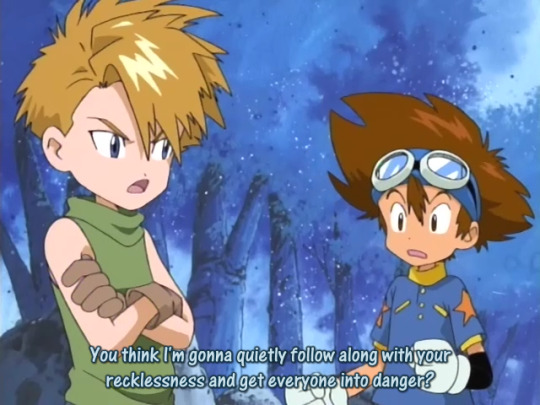

While the trope of “the shounen hero and the cool rival often having friction” is quite common in anime like this, Adventure’s play on it is actually quite different from how it would usually be played elsewhere. In most other shounen anime, this kind of relationship would have to do with something like the hot-blooded protagonist wanting to charge in and the cool-headed person wanting to be more “rational” about it, but in Adventure, Taichi and Yamato are pit against each other due to reasons that have to do with emotions. Yamato, contrary to what his character archetype might suggest, is someone who’s openly passionate and emotional, and is also someone who goes out of his way to care about others and their welfare -- so he often gets into fights with Taichi because he perceives Taichi to be insensitive and not putting sufficient thought into the others.
Yamato’s reactions are certainly extreme -- Adventure episodes 9 very clearly depicts him as the one losing control of his emotions and escalating the argument with Taichi to a full-on fight, whereas Taichi wanted him to calm down -- but he’s not fundamentally wrong in that this is an aspect Taichi needs to improve about, because it is true that Taichi tends to take the first suggestion of “what’ll get something done” that pops into his head, but also has a problem of vastly underestimating how dangerous things might be.
Again -- and this is very important to stress -- it’s not that he doesn’t care about others, and it’s not that he’s unaware of the dangers around him or the potential for repercussions! As Sora says in Adventure episode 16, he is conscientious of his surroundings and aware of potential risks. He has always put thought into his actions, and he doesn’t just charge into things with no rhyme or reason. He just has an abysmally poor sense of judgment, because he’s so naturally chill that he thinks “it’ll be fine, don’t worry!” -- and thus starts stubbornly locking down on what he wants to do because he’s so sure it’ll be fine and that everyone (usually Yamato) is overreacting.
If you want a specific example about Taichi’s tendency to misjudge: in Adventure episode 9, Taichi and Yamato get in a fight when Yamato perceives Taichi as too insensitive about Takeru’s potential welfare, which weirds Taichi out because Yamato’s being awfully overprotective. On its face, it might seem hypocritical because we later find out in Adventure episode 48 that Taichi is just as overprotective of his own sister, but it’s important to note that in the relevant episode, Taichi states that he has to go out of his way because Hikari continually fails to vocalize whenever she’s hurt or in pain. This implies that Taichi sees Takeru as someone who’s clearly capable of taking care of himself because he expresses himself better (and thus, Taichi doesn’t understand why Yamato has to go out of his way for him). Indeed, Takeru ends up latching onto Taichi because he sees him as treating him with the independence that Yamato won’t -- but Takeru has his own very deep-seated emotional issues that he just happens to be very good at hiding, and while Taichi is certainly always looking out for Takeru, he never seemed to have become aware of this problem.
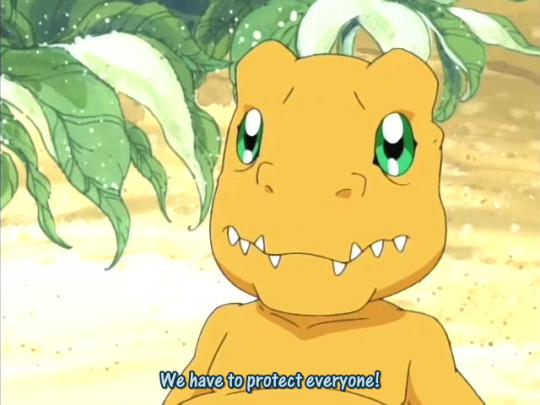
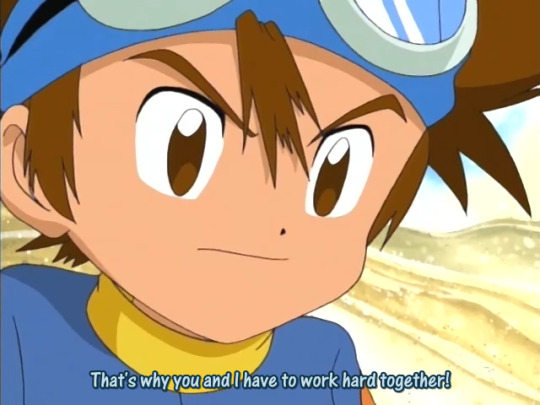
This difficulty in judgment leads into a certain pattern of behavior that Taichi exhibits that only comes up in very specific situations, but is so consistently depicted that it’s basically an inherent trait of his: what I call the “Yagami Taichi stress response”.
Taichi is the kind of selfless person who prioritizes others’ welfare over himself, and there are times when it will often fall into almost self-destructive levels. (This is a trait he actually shares with his sister, although the two of them naturally deal with it in very different ways.) His first priority is “helping everyone”, and especially “helping anyone who’s in trouble” (especially when it’s happening right in front of him). Which means that whenever he feels that others are depending on him for something, he ends up often taking too much responsibility for everyone’s welfare, and starts cracking under the pressure.
Because Taichi is the kind of person who prioritizes “action first” and figuring things out as they go along, this means that his reaction to stress is basically becoming a completely unfocused mess. Or, in other words, he lets the thought of but we have to do something!! completely consume his head, methodology be damned, and he starts panicking and doing everything in every which way to get it done, to the point he starts lashing out at others or becoming an emotional wreck because of the stress. The first time we see this is Adventure episode 16, where, being the only one with a working Crest and feeling that he and Agumon have the responsibility of protecting everyone, starts pushing himself and Agumon to carry everyone’s burdens, resulting in everything going wrong and the dark evolution to SkullGreymon at the end of the episode.
Again: It’s important to remember that, even at his “worst”, Taichi’s main priority is helping and protecting others, which means that his way of responding to that stress is basically determining that he’ll take all of the responsibility onto himself. That involves things like forcing himself to “work harder for everyone’s sake”, or becoming dangerously self-sacrificial, or at least allowing himself to become an emotional wreck because as much as he knows better, his one strongest thought is always we have to do something!!
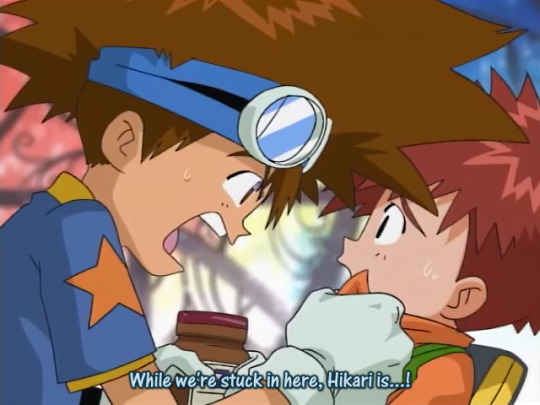
Taichi exhibits more of this behavior in Adventure episodes 48 and 49, to the point he gets unusually aggressive with Koushirou (which is also explicitly pointed out as him not acting like his usual self) once he starts panicking about Hikari’s welfare. Again, note that all of this stems from we have to do something!! -- he basically starts panicking because despite Koushirou clearly doing the best he can, once things start going south, it’s just not enough.
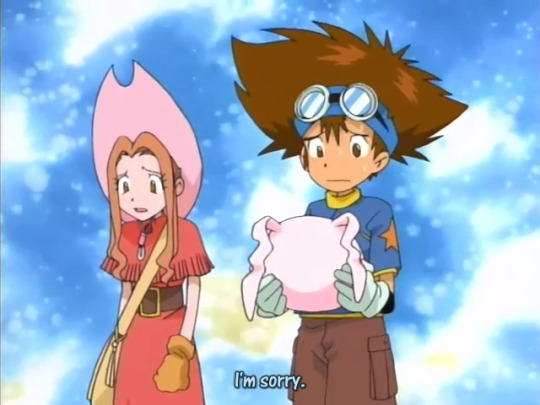
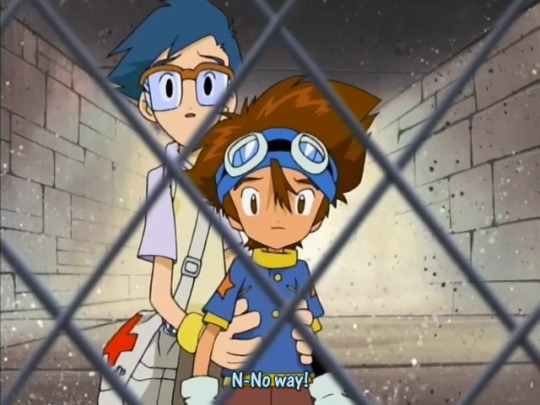
So, speaking of things going south: because Taichi often misjudges situations, whenever things go wrong, he takes it badly. This is someone whose first course of action is to “act first and work it out as we go along,” but the number one thing he can’t stand is seeing other people get hurt, and so when other people do get hurt because of the consequences, Taichi shuts down -- for instance, when he learns that his ploy to attempt to get Greymon to evolve ended up hurting Koromon and everyone around him in Adventure episodes 16-17, and when his taking the Digital World too lightly (taking Koushirou’s explanation of it being “like a game world” at too much face value) ends up getting Sora in trouble and his own life in danger.
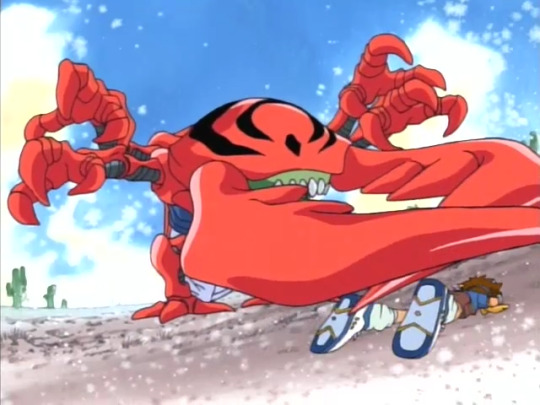
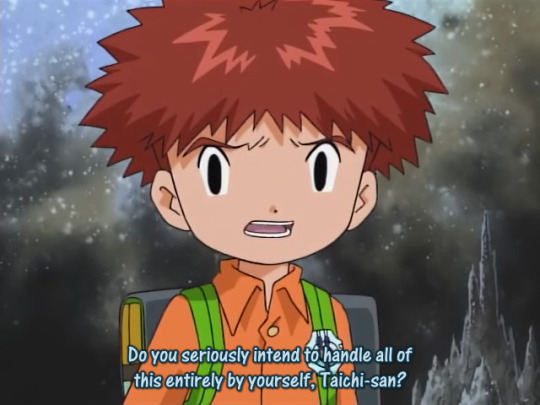
Which leads to a certain degree of irony: Taichi’s behavior isn’t normally out of solely recklessness -- mainly really poor judgment and a tendency to underestimate things -- but when he does slip up and start having to deal with consequences, he does become reckless. But because this recklessness is out of a desire to “not let anyone else get hurt”, it results in him being reckless specifically with his own welfare -- he’s the kind of person who “takes too much responsibility onto himself”, and his way of responding to the issues of “someone might get hurt” and “but we have to do something!!” means that he, by default, responds to everything with “okay, then I’ll be the one who gets hurt!” Or in other words, his solution to preventing other casualties while still doing something to help others involves becoming dangerously self-sacrificial. Because in the end, Taichi is the kind of person who hates seeing people being in trouble or hurt in front of him, and his instinct is to always protect people, no matter what.
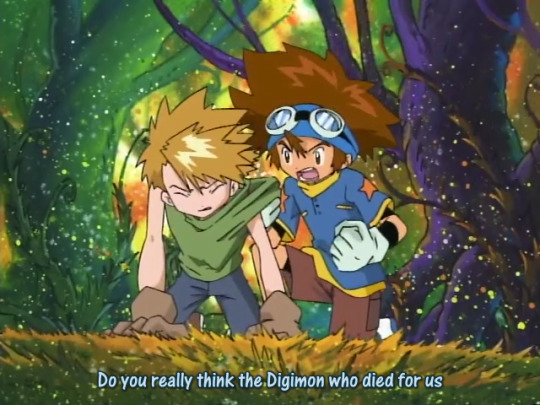
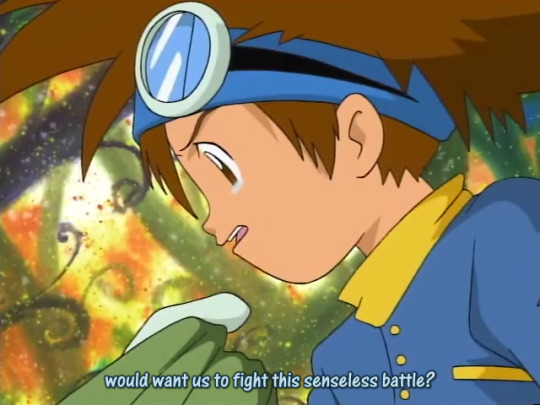
But, again: Taichi’s way of “action first” is not a fundamentally bad thing -- remember, Adventure episode 21 established very well that this trait of his is very good for bringing him out of his biggest bouts of hesitation, because he has a very practical understanding of the need to fight in order to prevent more casualties. This is especially because the final arc of Adventure deals heavily with the concept of “collateral damage”, or the question of how to handle fighting to save people, when people are inevitably hurt (or, in this case, dying) in the process.
Yamato accuses Taichi in Adventure episode 43 of not being conscientious enough about the friends they’ve lost in the process, but once Yamato succumbs to his resentment and personal beefs and starts selfishly picking a fight with Taichi in Adventure episode 44-45, Taichi indicates that he is keeping his fallen friends in mind -- it’s just that, to him, not continuing the fight is an insult to everything they’d died for (especially because, indeed, more people will get hurt if they don’t do something).
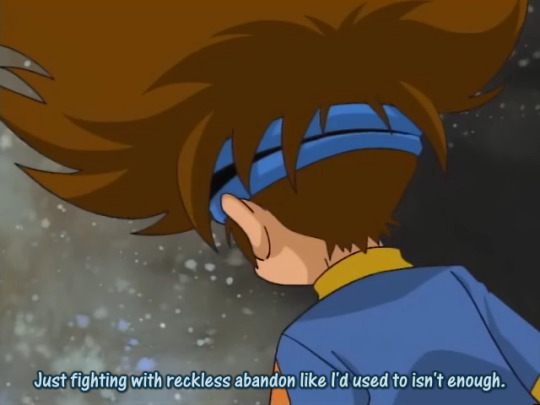
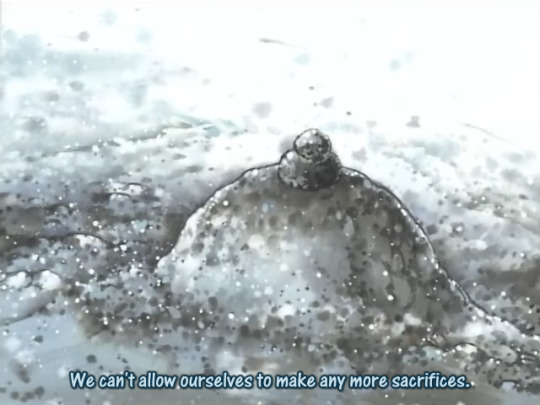
And, ultimately, in Adventure episode 50, Taichi does conclude that Yamato, Jou, and Mimi are right about one thing: while he’s always been right about them needing to do something, they do at least need to be careful about how they go about it so that they don’t incur more sacrifices along the way. Fortunately, Taichi is a soccer captain and perfectly capable of quickly coming up with a suitable plan on the fly (he even cites it in this episode, and in fact had already demonstrated an ability to come up with tactics when necessary back in Adventure episode 20) -- it’s not that he’s never been able to do flexible thinking, it’s just that his natural tendency to be “too chill’ about things and overestimate the efficacy of the first thing that popped into his head was something he needed to learn to think through a little harder.
And so, the final episodes of Adventure indicate him finally starting to tap into his capacity for that -- thus truly becoming the definition of the Adventure group’s “leader”.
Taichi after Adventure
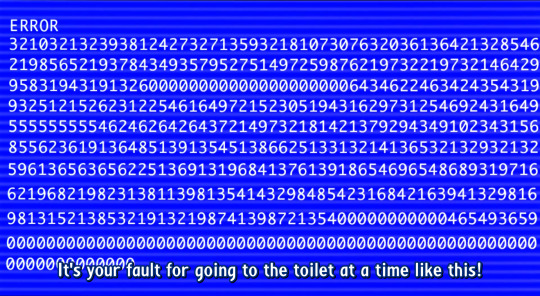
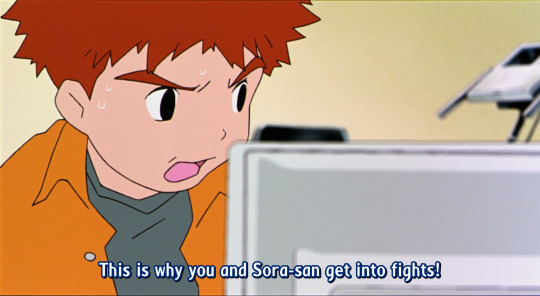
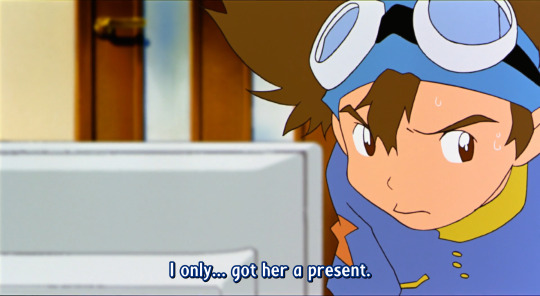
We learn in Our War Game! that Taichi still has a bit of a way to go in terms of the “emotional sensitivity” part, most notably when Taichi starts getting defensive when he accidentally disrupts the computer connection, and Koushirou (most likely correctly) pinpoints this insensitivity as the likely reason he and Sora got into a nasty fight prior to the events of the movie. In fact, while Taichi already clearly had some shades of this in Adventure, when his “teasing” of others or stepping over their boundaries could sometimes go a little too far, it’s especially indicated here that Taichi is very, very bad at dispute resolution, because he keeps trying to deflect blame for his own actions and indirectly accuses Sora of being the irrational one in regards to their argument. (Again, for anyone entangled in a dispute with a friend: “dismissing the other person’s feelings” and going for the ad hominem, instead of at the very least acknowledging them in the process of making your point, is the number one worst way to handle this.)
Of course, Taichi wouldn’t have gotten this far if he didn’t have the natural charisma to compensate -- again, he’s fundamentally someone who cares about other people and attends to them. But, unfortunately, he’s still bad at knowing how to deal with other people’s emotions and learning to deal with them with proper empathy...
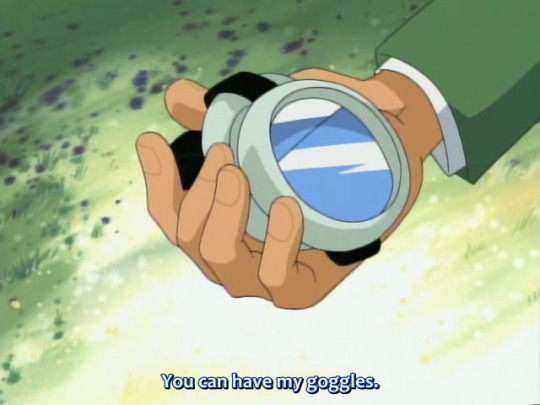
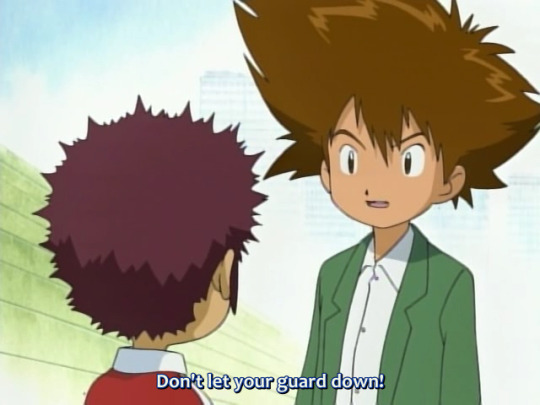
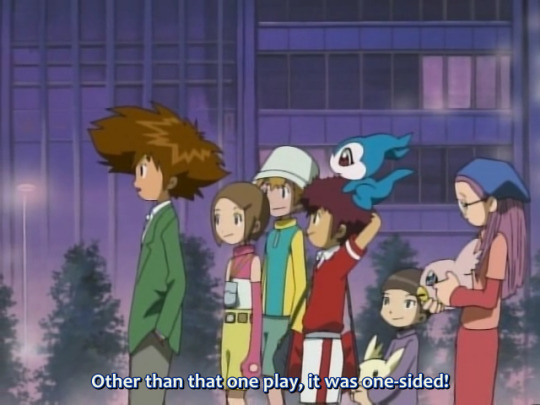
...So, in fact, it’s striking that the Taichi we initially meet in 02 is someone who, most of the time, seems to come off as very mature and put-together. The fact that he so willingly turned over his goggles to Daisuke at the beginning of the episode is a really huge deal, frankly -- even if you don’t subscribe to the theory that there’s any major sentimental backstory to it a la V-Tamer, that’s still an item he’s kept on him since he was a tiny child and clearly must have a huge amount of attachment to, yet he immediately handed it over to Daisuke the moment he felt Daisuke was worthy of it.
It’s actually quite a bit of a swerve for those of us used to the more “playful” Taichi who sometimes took things way too lightly, but it’s also important to realize that this is the Taichi that Daisuke and his friends see. This is especially in light of the fact that Daisuke starts off the series with a very severe inability to be assertive, so Taichi, who’s always been naturally assertive from the get-go (almost too much sometimes), is everything he is not, and therefore admires.

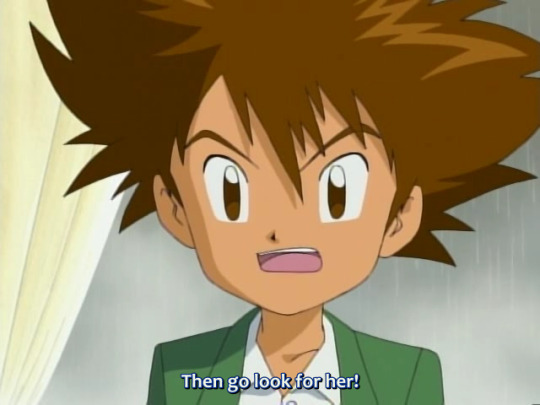
Taichi is still Taichi, which means that he’s still subject to the Yagami Taichi stress response, and he gets very close to blowing up angrily at the others when they show up late. But unlike how he had a whole train of being rather out of control when emotionally compromised in Adventure episodes 48-49, he gets himself together fairly quickly and admits that he also didn’t want to force everyone to come if they didn’t want to (to the point where he had even thought about going alone with Hikari in the worst-case scenario -- again, note the tendency for self-sacrifice and putting responsibility on himself).
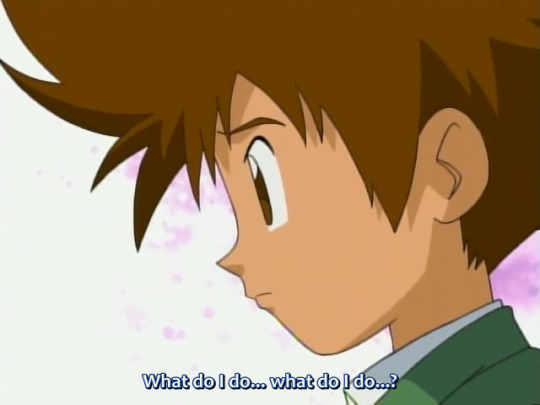
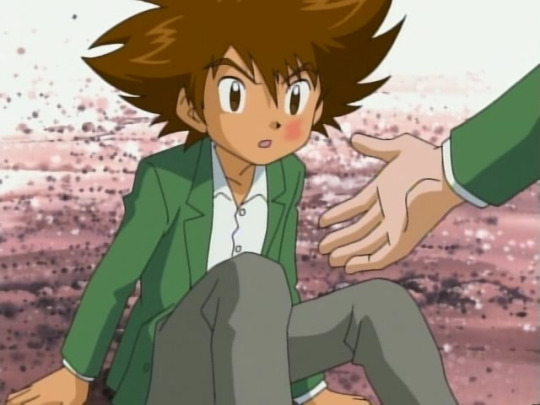

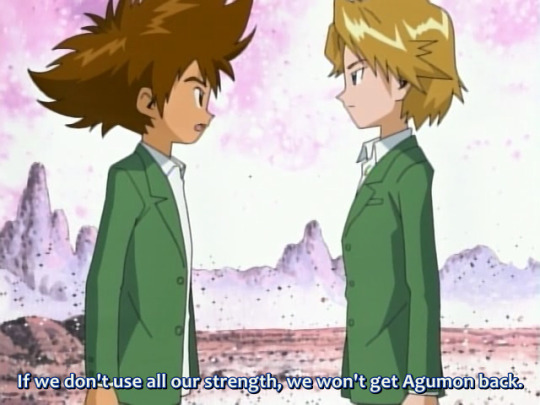
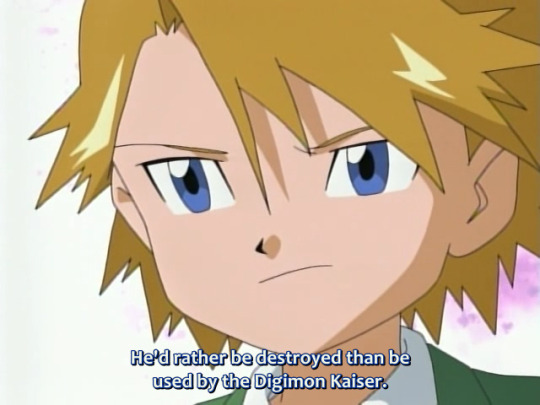
We also see him about to lapse into it again at the end of the episode, when he freezes up because he’s not sure about what to do in regards to the potential of hurting Agumon in the process of getting him back -- but Yamato manages to get him back on his feet, rather literally, and with a punch to the face.
This punch tends to be really often misinterpreted as if violence is just a fact of life when it comes to Taichi and Yamato, but it is very, very important to understand the context behind this scene and how it differs from the two’s relationship in Adventure. Whenever the two fought back in Adventure, it would be a very vicious argument with the two genuinely angry at each other, and with Yamato accusing Taichi of being insensitive and thus becoming hostile and resentful towards him. In this scene, however, Yamato has become conscientious of Taichi’s own feelings and reasons for hesitating. This is evidenced by the fact he only does a single punch and holds out his hand to Taichi right after -- said punch was strictly meant as one meant to snap him back to reality, and Yamato holds out that hand knowing that Taichi will not take it as anger or resentment, but rather “I did this because you needed something to get you back into focus, I know you also know this and won’t take it as an insult, and I understand your feelings and want to help you.”
It’s important in establishing the level of deep trust Taichi and Yamato have where they understand each other’s positions now without fighting over it -- the two of them even point out in the next episode that the reason they can get away with this is because of how much worse they used to go through before, but now, the two of them treat each other with mutual sympathy, understanding, and support, and devoid of condescension whatsoever. And because of that, Taichi is able to “snap out” of his hesitation much more quickly than he would three years prior, because now he has Yamato’s emotional support, and Yamato even frames the situation in a way the “we have to do something!!” Taichi would understand: if they don’t do something, Agumon will continue to be the Kaiser’s slave destroying everything that he himself would never want to see destroyed, and even if they end up accidentally losing him in the process, it would arguably be a bigger mercy to him than it would to let him continue in this state. It’s all very practical reasoning that works best with Taichi’s way of thinking, and because of that, they’re able to push forward into the events of the next episode.
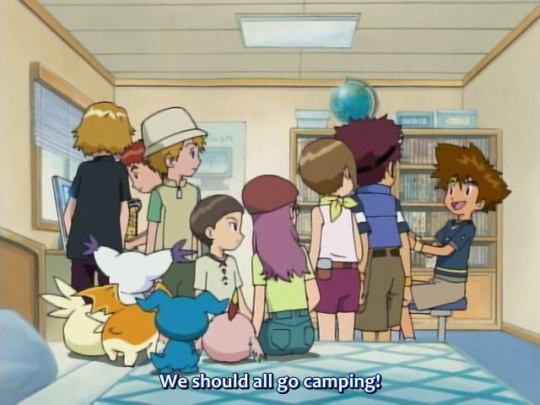
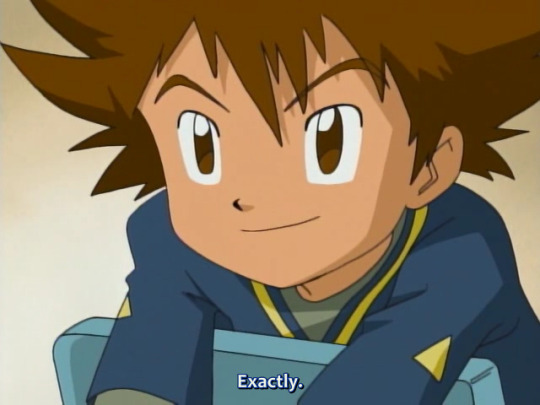
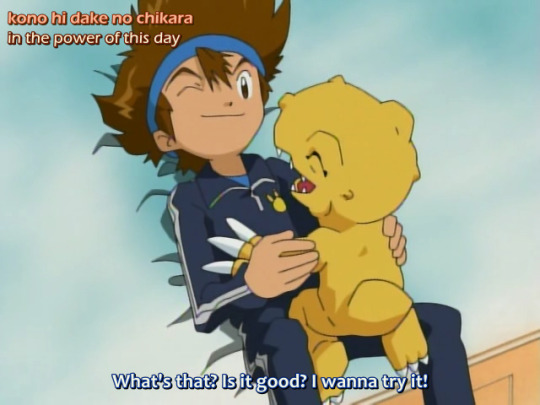
But just because he’s become more mature doesn’t mean he’s lost his characteristic charisma or ability to be playful or a tease -- after all, Taichi has always had a penchant for a bit of a smug personality, sometimes even bordering on the petulant. This especially comes out when he’s with Agumon, but, really, Taichi is a person who really likes fun.
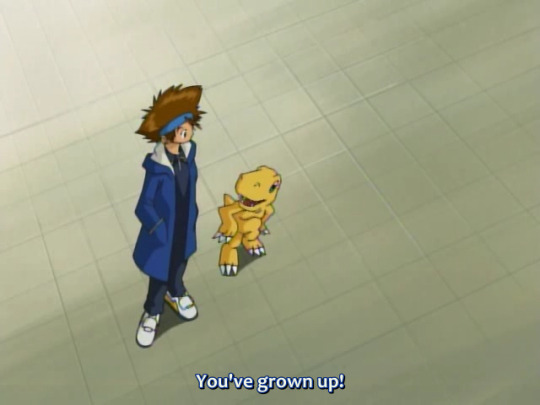
On another interesting note, however, Taichi sends Sora off in 02 episode 38 when he’s very heavily implied to have caught on that Sora is about to confess to Yamato, and pushes her on without giving her grief for it. Regardless of whether you subscribe to the theory that Taichi has his own unresolved feelings in the situation, the important part is that he understood that this was a grave enough situation for Sora that this did not merit teasing her or insensitively poking into her feelings on it -- in other words, it’s a huge contrast to Adventure episode 26 when he was clearly at a loss on how to deal with her when she was emotionally compromised, and Agumon and Gabumon commented that he wasn’t as mature as Yamato in dealing with this.
But now, Taichi is much more capable of showing actual empathy for others and understanding when it’s the time to hold back on the teasing or potential insensitivity, and for that, Agumon compliments him on the same maturity he’d failed to express three years prior.
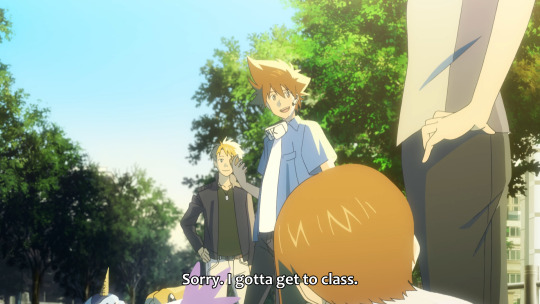
By the time we get to Kizuna, the fact that Taichi is one of the lead protagonists is for obvious meta reasons (he’s the protagonist of Adventure, after all), but it also makes sense that a movie centered around the millennial existential crisis -- and, specifically, the issue of career uncertainty -- would have him as a major player in it. Remembering that Taichi is fundamentally the kind of person who operates as “act first, deal with it later,” it makes perfect sense that the terrifying pressure of dealing with something as vague and uncertain as career pressure would be something that Taichi would continually put off. Again, Taichi is a very practical-minded person who usually works best with things that are clearly happening in front of him, so “wide-ranging” things are things he plays badly with.
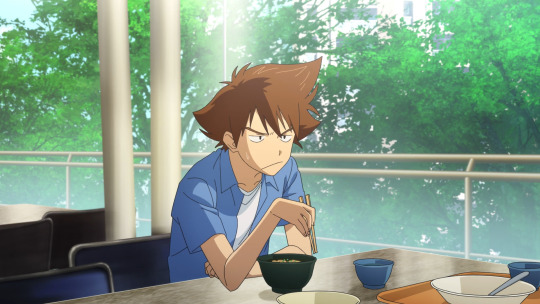
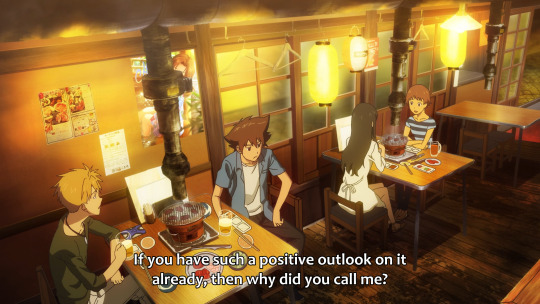

Despite Taichi being very clearly depicted as “out of it” for this movie, at the very least, certain fundamental personality traits of his haven’t gone away -- for one, he’s still one of the most expressive characters in the movie (to the point many a fan has commented on his jackpot of facial expressions) in terms of petulance, sometimes getting a little defensive, and driving poor Koushirou a little nuts with his tendency to be reckless with electronics. He also gets a bit cocky during the battle with Eosmon, which, again, tracks with his tendency to do that every so often (and to be fair to him, everyone was guilty of severely underestimating Eosmon at the time, so it’s not like this was a major miscalculation on Taichi’s part).
Moreover, much like in 02, Taichi and Yamato are understanding of each other’s feelings to the extent that Yamato is the first person Taichi calls to dump his feelings about his existential crisis over. Even though they’re still prone to some mild bickering at the beginning of the movie, they immediately go back on high-fiving terms right after, so it’s a very far cry from the time back in Adventure when Yamato would look down on Taichi for being insensitive.
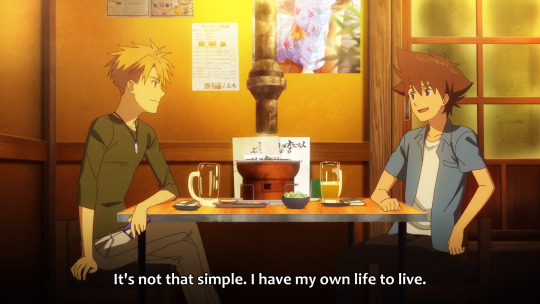
But here, we have this one line that basically represents the source of all of the problems Taichi ends up going through in this movie, including the reason for his loss of Agumon: Taichi is trying to “force” himself to become an independent person, and in the process is pushing Agumon away, and, on a more metaphorical level, his own self.
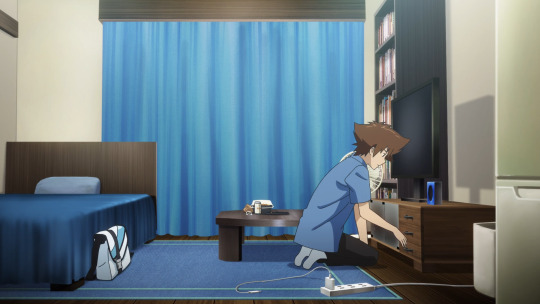
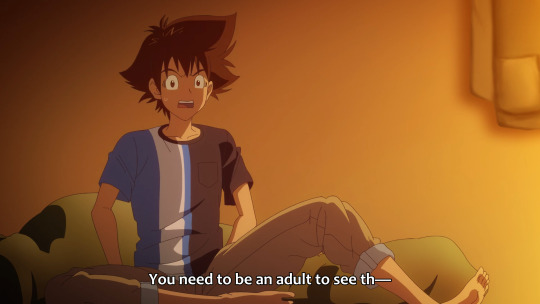
Taichi moved out of his parents’ house under the pretense of not burdening his family, but Hikari’s comment about their mother wanting him to drop by indicates that it’s not likely they necessarily wanted him to move out -- and despite that, Taichi is miserable in his daily routine of walking back and forth from school and working at a part-time job and eating convenience store food. He’s clearly lonely, yet he won’t allow Agumon into his room (it’s stated that his visit midway into the movie is his first time here). He keeps his old goggles and Digivice, yet he shuts it in a drawer and only opens the drawer to stare at it from time to time, and when Agumon finally does visit and finds his AVs, Taichi freaks out and pins it as an “adult thing” before he finds himself in the awkward situation of basically gatekeeping his own partner with a societal standard he doesn’t even understand.
I should point out that the AVs are not strictly porn, if you want to be really technical about it; it’s “gravure” videos, involving a cosplayer dressing up in sexy/high-exposure outfits and striking suggestive poses, but it’s not actually explicit porn. Moreover, a toned-down version of this scene exists in the Shueisha Mirai version of the novel, where the issue is not about AVs but rather the fact that Taichi only has alcohol in his fridge -- absolutely nothing non-alcoholic, despite how impractical this is -- because “[he’s] an adult, after all.” So the point of this scene is that Taichi’s being performative, or in other words trying to do Adult Things because That’s What Adults Do. And since a Digimon partner is representative of the inner self, and especially established in 02 to have relevance to one’s “less dignified and more childish dreams”, Taichi looking down on Agumon, i.e. looking down on himself, becomes the reason why he ends up losing him at the end of this movie.
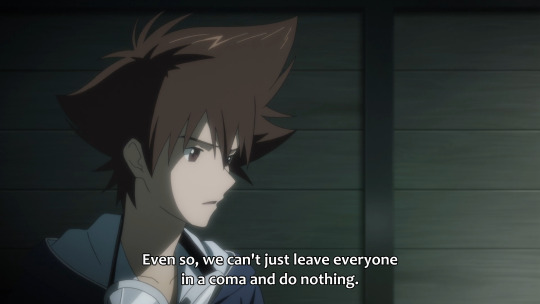
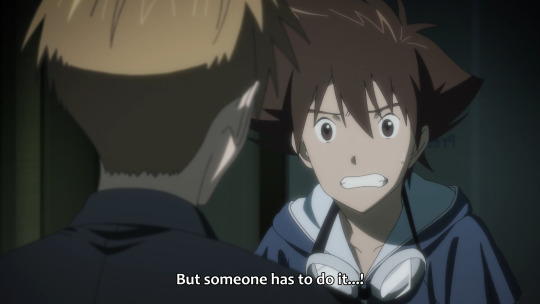
As things get worse for Taichi and the crisis escalates, we actually get another glimpse of the Yagami Taichi stress response -- Yamato confronts him on whether he’s okay with going in to save all of the Eosmon victims despite knowing what’ll happen to their partners. Taichi, frantically (Hanae Natsuki’s voice acting really sells it here), has an emotional outburst and professes that, no, of course he’s not, but, again: they have to do something!! Because in the end, Taichi is a selfless person who understands that bad things are happening to people now, and the important thing is saving them now and dealing with the consequences once that’s done with, and even Yamato admits that, as much as he hates it, this is the correct answer.

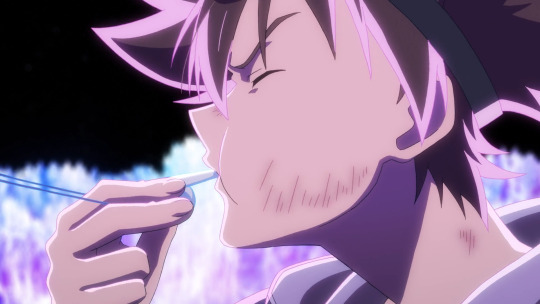
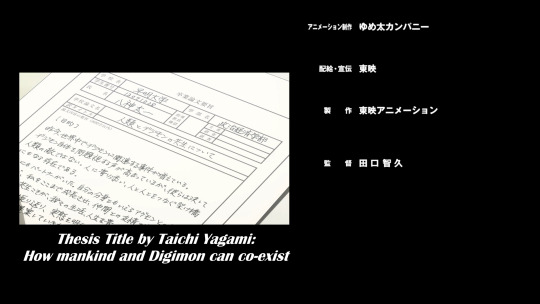
Taichi does, unfortunately, lose Agumon at the end of the movie, but there are multiple indications he’s already on his way to getting him back, given that Taichi’s starting to address all of the problems he was neck deep in at the start of the movie. In the middle of the movie, after having shut his goggles in the drawer all of this time and only pulling it out whenever he was depressed, he decides to embrace the courage they initially symbolized and puts them back on his neck, and when we reach the climax of the movie, he uses Hikari’s old whistle to wake everyone up. This needs to be distinguished from all of the “nostalgia” everyone else had been drowning themselves in by looping themselves eternally in old memories from a desire to never move on from them; symbolically speaking, Taichi’s blowing of the whistle represents acknowledging the important things in your past, and making productive use of them to move onto the future, rather than the unhealthy reactions of either drowning eternally in nostalgia, or performatively shutting everything out about your past in a bid to reach some arbitrary standard of adulthood.
Hence, Taichi’s thesis -- the one he had failed to write at the beginning of the movie -- is only filled out once Taichi embraces that past version of himself, because his thesis summary is about reflection on his past experiences, and making use of those to think about how to apply them to the future.
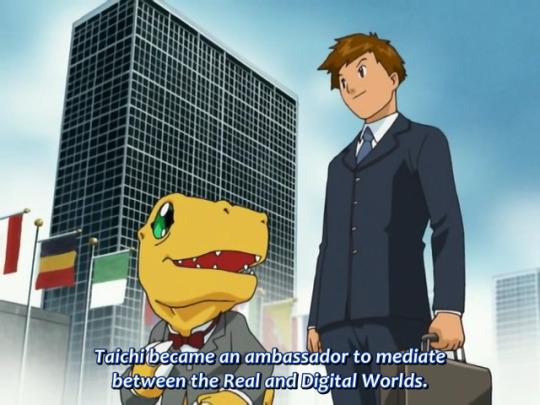
This is, obviously, intended as a lead-up to the 02 epilogue in which Taichi becomes an ambassador -- or in other words, someone who indeed specializes in “bringing humans and Digimon together” and offering proposals on how they can coexist in the future. Agumon, of course, is an important part of this job (look at his suit and bowtie!), instead of Taichi shutting him out and treating him like someone who doesn’t belong in his adult life.
Of the careers depicted in the epilogue, Taichi’s is the most “furthest-reaching”, since, as a diplomat, he has influence over a pretty huge range of things, which fits with Taichi’s tendency to shoot for some pretty high things -- and, also, conceptually, it works well with what we’ve always known since Adventure to be Taichi’s true specialties as a “leader”: having the charisma and understanding to bring people from different places together, and to lead them all forward.
#digimon#digimon adventure#digimon adventure 02#digimon adventure last evolution kizuna#kizuna spoilers#yagami taichi#taichi yagami#shihameta
203 notes
·
View notes
Note
Hello! I am answering your call for Sonamy asks! :)
I have multiple long-form posts about their relationship (and specifically Sonic's stake in the matter), which I would link to if this wasn't an ask, but I encourage you to read those if you're up for it!
To give you a brief summary though (I promise this is considered "brief" lol), Sonamy works because Sonic and Amy have a few fundamental aspects going for them:
They each offer the other something that completes them: Sonic gives Amy encouragement and inspiration to use her skills for good (emotion, love, and physical prowess), as well as opportunities to actually use her skills with his adventures (and her own). Conversely, Amy gives Sonic a safe place to land and to engage with his emotions, something he struggles immensely with (I'm working on a piece about this, actually). In short, Amy unlocks a lot of Sonic's emotions and helps him feel and navigate them. No other character makes Sonic react with such a wide range of emotions, and no other character allows Sonic to be fully and completely himself--with and without the hero mask.
The relationship (and its romantic qualities) is extremely subtle in nature, which adds to its appeal and sense of depth: I can only truly get behind ships when they go beyond just potential--I need to see it supported by canon, and Sonamy is in the best ways. Sonic and Amy understand each other on such an intricate level that they don't often need to use words to communicate. There's an air of connection that floats between them that, combined with their history, shows exactly what they're thinking--they never state the obvious because they don't need to, which makes the moments where they do state the obvious a lot more impactful. Words aren't wasted between them. Their relationship is described by canon sources (like Sonic Channel, for instance) as nuanced, complicated, and multi-faceted--what looks from the outside as something confusing or otherwise questionable is bathed in layers of meaning for the hedgehogs. Their love is visible (especially from Amy), but the depths of it are private, intimate, and expansive--and that makes it so special.
They have a lot in common, which makes their lifestyles compatible long-term, but they're also not afraid of each other: they both hate boredom and actively seek out adventure (alone and together), they're highly emotionally charged and passionate (positive and negative emotions), and have strong desires for justice and good in the world. At the same time, though, they're not blinded by their affections--Sonic stands up to Amy when he needs to (most recently in Frontiers), and Amy definitely stands up to Sonic when she needs to. In fact, going back to unlocking emotions, Amy is by far the character with the most success in cutting through Sonic's stubbornness and getting him to reconsider something. This willingness to communicate on both fronts is extremely healthy and good for both of them.
Feel free to ask questions! I know I don't provide too many specific examples but I didn't wanna write you a novel! I'll tag my specific relevant posts if you'd like, as well! I hope this helps :)
I see all your points! I just really dislike the whole "Romantic relationship completes the characters!!!" Since I am aroace with no romantic drive. At all. I know I'm not really missing anything in life but kind of seeing that everywhere bothers me... plus I just REALLY like Sonic on his own. Sonic can communicate without words with other characters too, like Tails and Knuckles. THEY'RE ALL FRIENDS!! BUDDIES!!! That super homosexual flaming moment in Frontiers with Knuckles when they were making faces at each other? No words exchanged they just knew. I am a HUGE advocate for being FRIENDS!!!! Friendship rules!!! Not everything has to be romantic.
There's also the thing of I really love Amy and Sonic as characters but it gets very bothersome when Amy's character in fandom stuff is only seen through how she impacts Sonic. She is her own character!! About spreading love!!! FRIENDS!!!! AHOWHAOHGUH
4 notes
·
View notes
Text
Shadow Work and the Language of Trauma
***note: this is not a well thought-out essay, it's three ideas in a trench coat. please forgive the spelling mistakes and understand that this is a thought process not a thought finished ***
It is my great hope that the way we talk about trauma has a fundamental reckoning soon.
The toll moralistic language around trauma has taken on me personally has been staggering and I can't imagine I'm the only person. What I mean by that is how western psychology in particular responded to the research around trauma by spreading this message of "it's not your fault" and "you didn't deserve that" and "you're not a bad person".
"What? But it's true!" you might say. Well, it's true - in a specific context. But when it's generalized there are issues that come from using such heavy language like "deserve", "bad", and "fault". I've seen a progressive uptick in people using the language of trauma in contexts where it really does not apply as talking about trauma (in this loaded moral way) is normalized*.* I think I've seen it most often used to escape the discomfort of being held accountable but I've also been seeing it used to hide an intolerance for experiences someone merely does not enjoy by moralizing it through the language of trauma and integrating it through a traumatic narrative instead of actually attending to the tolerance issue.
Example: Person A is upset with Person B. Person A is speaking in a way Person B does not like but that they are not unhealthy or abusive for doing so (ie. being slightly louder than Person B would prefer, naming their experience of a situation in a different way than Person B would). Person B physically and emotionally cannot tolerate this exposure to something they don't like but rather than use a healthy coping mechanism like breathwork and then active listening, they connect the discomfort with a past largely dissimilar traumatic experience and begin to paint Person A as if they're being abusive for doing what they don't like - "Stop yelling at me!" or "You're gaslighting me!" For Person A, this send the message their neutral/healthy behavior is actually abusive and bad and healthy behavior is only what Person B has a tolerance for.
Here's the rub of it though. Person B's lack of physical and emotional tolerance is itself a symptom of past trauma. Connecting the experience to unrelated trauma and painting the other person as abusive as a way to deal with that intolerance is also a trauma response. But for Person A this is fresh trauma or possibly retraumatizing depending on their experiences.
Everyone involved is dealing with trauma, but since trauma carries this moral weight in our discussions, Person B is highly incentivized to focus the conversation on their trauma so they can escape being a "bad" person. Moral language tends to be totalizing meaning Person A might not feel like they can acknowledge Person B's past trauma for fear of their own being erased and not getting support. It's a bad fucking time.
This situation is not one of resilience, it makes communities weaker, and it's a conversation trauma professionals are only relatively recently having. But those of you who've been here a minute know I'm not really social theorist, I'm a shadow worker.
And my concern with is that this type of moralizing and the trauma-as-coping-mechanism in particular pose a real risk for shadow workers who don't confront and name it in themselves and others. For a few reasons.
For one, trauma is fundamentally disruptive to how we organize our personhood - an importance factor in doing magic - and if you are in a position where you're either using your trauma to moralize your way out of situations you can't tolerate or having to be around someone who is doing that frequently, there's a high incentive not to integrate fully, to give up your Power generally so you can exert what seems like more control in the micro of how those situations play out. By incentive I mean - who the fuck wants to be the "bad" person at the end of that and if "good" people are the one that's more traumatized than the other, well...you see where I'm going. If your immediate circumstances are so compelling that giving up your Power feels like a matter of life and death - it's going to be hard to do any integration work that doesn't immediately get undone.
Because of it's impact on Power, any spellwork done on the issue - without remediation for the issue itself - is likely to get weaker and be less helpful as time wears on. It's just kind of a black hole of a situation.
Two, it encourages black and white thinking which is at odds with Reality and you can't reshape reality skillfully if your view to begin with is prone to narrowing and narrowing. Not only are you less likely to assess and isolate an accurate root cause to perform work on, you're also less likely to select an effective spell given the situation in front of you. If you're continually using trauma-as-coping-mechanism and villainizing other people for what some part of you likely knows is totally neutral behavior, you're more likely to isolate them as the root cause and cast spell toward changing them. There are two outcomes from this - the spell work works on them but doesn't ultimately achieve what you want because what you really want is to be safe and they weren't being unsafe to begin with or, what more likely from what I've seen, the spellwork doesn't work because a faction of you knows that the root cause is inside you - which can even lead to curses or cutting ties to backfire on to you if you're not careful.
Okay so what do you do? To be honest, I've not seen a specific modality that works terribly effectively on this. I wish socially we'd have a reckoning and that would help a good many people. The best I have is something that I know will be incredibly unpopular but - stop moralizing trauma. Both people who've caused it and people who have it. I think the prospect of that is so scary because people think it's the only way to hold abusers accountable for their actions. But I promise you it's not. In actuality, labeling someone as "bad" is more harmful for us and holds less weight than talking about the material harms their abuse has had on us. I include emotional harm in material harms because I mean, it is. The body and the mind aren't separate so feelings are material.
From the prior example, maybe Person A makes the decision not to participate in the moralizing and instead stops to name the harms Person B's coping mechanism is having on them - confusing healthy behavior with preferred behavior, distress at being told a neutral/healthy behavior is abusive and by extension they're bad and deserving of being socially isolated or worse. Even Person B doesn't respond in a material perspective, Person A retains their Power by naming what's happening in reality as they see it and not fracturing to maintain the high ground.
Better yet, Person B, when they can't tolerate the actions Person A is doing that they don't like, could name that - "I'm having trouble tolerating what you're doing even though it's neutral/healthy. Parts of me want to say what you're doing is abusive even though in reality it is not." Then Person B would be able to rob the trauma-as-coping mechanism of it's appeal and retain their Power as well.
Clarity of language, free for the totalizing effects of morality, I think is the clearest path forward to putting down the trauma-as-coping mechanism. But it has to go both ways; stop using it for those who've harmed you and stop using it to describe yourself. I know that's the part I'm still struggling with a lot.
Anyways, I hope this is helpful to someone out there. You're not bad person for overgeneralizing your trauma to cope with things you merely dislike - but it does, in my experience, come at a cost to your ability to do effective spellwork. It's worth looking at the cost and seeing if it's worth continuing to use the coping mechanism to you.
40 notes
·
View notes
Text
Title: Dhalgren
Author: Walter Tevis
Rating: 2/5 stars
I picked this up expecting to like it, even expecting to like it a lot, because a friend has praised it highly and I trust his judgment.
Yet after finishing it -- and the reader is urged to complete it at its own pace -- I found it not exactly terrible, but not at all compelling, either. I had a good time with it, and I liked the first half even if the second half soured me on it. But the experience wasn't at all similar to my friend's. I guess we're both in the habit of liking books because our friends love them -- or because we like our friends -- which is a tendency I suspect may not always be a good idea.
This book is a slow, sprawling, rambling meditation on the theme of an alien civilization in which everybody has undergone some horrible experience or injury, with the result that they've become weird, twisted-brained people -- perhaps as a result of trauma, or genetic defects, or both -- who never recover their faculties of speech or cognition, and seem to have lost all their memories except for fragments from their childhood.
Each character, in a way, has to struggle against this. As a result of these things, they may have no memory of their home or family, or of the people who once were their friends. For them, the world of daily life and ordinary conversation is a terrifying, inchoate nightmare, and when they find it they may be terrified to begin with. They may even be unable to take any care of themselves -- like, say, cleaning their own apartment -- because their lives may have become so chaotic that they can't understand how to go through them with anything resembling coherence.
The language in this book, and the ideas it presents, are very different from what I usually like in fiction. This book isn't especially plot-driven (although there are plenty of moments that would work fine as such, just without a clear sense of a unified plot). The characters never really interact in a way that looks like "character-driven" -- although, because of the way the book's perspective is limited to the eyes of one character, it's hard not to feel like one is being given an inside view of a strange world, especially for the first part. Even at the end -- when everything has become very clear and the narration focuses on the main character's thoughts and memories -- one still has this impression.
What you have here is more an alien view of the human world -- as an outsider would be able to take in our world with only minimal distortion -- than an account of human life, which is what fiction usually is about. Like most of Tevis's other fiction, which includes his earlier, better-known novel (The Man In the High Castle), it seems to have more of an appeal as a work of science fiction than as a mainstream fiction story. Tevis has a talent for evoking strangeness -- not just the literal strangeness of Sputnik-like technology -- but of the sort of strangeness that can arise from some fundamental, metaphysical break, from a gap between what "we" can grasp and comprehend in our mundane, human way and the ultimate strangeness that exists, like another dimension, outside our ordinary experience.
It's not an alien world that I found unengaging (I liked it a lot) but rather a human world that just isn't really very engaging. The strange characters, the fractured-perspective alien view, and the lack of plot are not at all what a lot of writers these days are doing, and that's what makes this novel a bit of an anachronism. So I found myself in the odd position of wanting to enjoy a book despite its being very different from the kinds of things I normally read, because at least it was different in some interesting ways. But it wasn't something I'd want to read just for its novelty value -- except in the same way that a lot of modern art is about its novelty value, or that people talk about classic novels being about "social criticism," i.e. about what they can teach us about the human condition. (Tevis has written some other books, I guess, in which he has tried to give us these kinds of lessons -- about the pain and loneliness of growing older in contemporary America, for instance -- but there's something really wrong with doing it in this particular novel.)
4 notes
·
View notes
Note
could you do 9.10 and 9.13 for episode reviews.
Love your takes btw.
9.10 Final Thoughts
well, well, well, if it isn’t my old friend season 9. God I love season 9. buckle in.
Plenty of what season 9 tries to do with angel drama falls flat, but plenty of it doesn’t. It’s at its strongest when interrogating the ways that the angels are looking for personal purpose, rather than folding themselves into various suit-clad factions. In this episode, we have Gadreel, Abner, and Thaddeus, all with very different takes.
Thaddeus is the most boring of the three—a straightforward narcissist and sadist. (Lucifer will follow in his rockstar-impersonating footsteps in s12. SPN clearly has a dim view of the music industry.) We don’t care when he dies, and we aren’t meant to.
Abner’s found a family, and he’s let go of revenge. He’s clearly found peace and happiness—but it’s stolen. I’m ambivalent about this. I guess I could take his word that his vessel was abusive and therefore deserves to have been permanently body-snatched, and I guess I could believe him when he says his new family loves him, even though they clearly don’t know what he is or what he’s done. His regard for humanity as something other than a project is… uncertain. Even if everything is as sunny as he explains to Gadreel, there is fundamental selfishness and short-sightedness here. Get what you want, Abner says, and never let go.
Gadreel asks Abner if his vessel is happy. This reveals both Abner’s scorn for his vessel, and Gadreel’s uncomfortable awareness of and respect for Sam (and his bartender vessel, who Gadreel stares at, and who accepts Gadreel back easily).
Gadreel! OF COURSE Gadreel’s gotta be the scapegoat for Lucifer’s release, HAHAHAH. I love him to pieces, oml. Seriously, the Sam parallels could not BE more blatant. I’ve talked about this before, that it makes the earned antipathy between them all the more alarming, all the more visceral. The big sticking point is that Gadreel’s years of pointless torture came prior to his “redemption” arc, rather than as a consequence of it. Gadreel has all of s5 Sam’s despair and helpless anger and self-loathing, all of his drive to set things right at any price, and all of it is amplified by his trauma.
Sam and Gadreel’s relationship is defined by its liminal spaces. Gadreel threatens to tear Sam apart, but he does not, even when he is tortured. He locks Sam away in a dream rather than force him to watch him kill, or to suffer. But when Sam forces Gadreel out, Gadreel leaps instantly on telling Sam he is weak, reciting back Sam’s fears and Gadreel’s own. This reads like Gadreel is aiming quite a lot of his own self-pity and self-hatred at Sam.
Cas’s murderous rage at Gadreel when his identity is revealed is fun. It shows that Heaven’s PR team did a good job, for one thing. But Cas is furious because it’s specifically Lucifer. And the Apocalypse, and all the attendant suffering, his and Dean’s and Sam’s. It’s a personal wrath.
“Stupid for the right reasons…” oh, Cas, your scarcity of positive human role models is showing. Also, Cas’s particular brand of reassurance here isn’t actually something Dean has a problem with. He expresses regret over having been tricked—he says he’s stupid, he says he got played—but he’s never in doubt that his intentions were good. He’s never in doubt that he did the righteous thing. He’s never in doubt that he’d do it again.
Dean apologizes to Cas for barring him from the bunker. (Sam will not receive an apology.) Cas compares what Dean did to Sam to what Cas did by trusting Naomi. There’s a key difference here. Cas’s moral compass is not the problem; it’s his critical thinking skills.
Crowley, Cas, and Dean are a hilarious trio. (Also, I really hope that Cas’s pimpmobile got to Heaven too, like the Impala.)
Crowley being genuinely sorry that Kevin’s gone and his willingness to risk his life to help Sam are the best two moments of the generally weak Crowley-has-human-blood plot line. They feel earned. [also Crowley’s ‘I told Kevin he should’ve run!’ is both accurate, funny, and sad.]
Let’s talk 4.21 parallels! I mean, first, the glaringly obvious: Sam locked down to be purged of something supernatural; Sam suffering; Dean unable to bear Sam’s tortured screams; a very atmospheric fan. Dean walking away.
and then, of course, there’s “at least he dies human.” Right off the bat, Dean tells Cas he’s going to kill Gadreel. Cas, concerned, says that this will kill Sam too; Dean, sounding tortured, says he knows. Now, obviously, Dean doesn’t kill Sam. He doesn’t even get particularly close. But it’s really interesting that this is the first thing Dean brings up! He declares unprompted that he’s ready to kill Sam rather than leave him possessed. Which is both a recapitulation of the save-him-or-kill-him mantra, and an ironic twist on the decision Dean made in 9.01. Then, Dean knew Sam would rather die than be possessed, but had him possessed anyway. Now, Dean has decided instead that Sam must die because he is possessed. Obviously Dean’s opinion on the possessing entity has changed in the meantime: Sam’s hasn’t, but Sam’s isn’t what matters.
Dean reaches new levels of PEAK IRONY when he declares that Cas should possess Sam too. Cas has to actually point out that Dean can’t, in fact, volunteer Sam’s permission. Because apparently Dean had forgotten, lmaooo. Crowley, on the other hand, is happy to oblige. Dean directs Cas to burn Sam’s tattoo off.
The language of this entire scene is so sexual. I mean, it’s Crowley, of course it is, double entendre is his first language. But this theme recurs again and again. Here it is just more pointed than usual. It is queasy.
Gadreel has Sam trapped in a Dean-type happy place—a hunt with ghouls and cheerleaders, no organic produce to be found. And I don’t think it’s because Gadreel doesn’t understand what Sam likes. I think it’s because Gadreel’s aim was for Sam to feel comfortable, not blissful. It smacks of Hallucifer, just a bit—using the verisimilitude of Dean’s louder moods rather than trying to appeal directly to Sam’s contentment, because of his always questionable, always a question, sense of reality. If things were too smooth, too cheerful, Sam might just be suspicious. Sam is easier to trick by proxy.
The HORROR of this episode for Sam: Gadreel washing someone’s blood off of Sam’s hands. Crowley pushing needles into his brain. Sam’s body and life as a bargaining chip as Gadreel threatens to kill him, and then as Dean threatens to kill him right back. The quiet heartbreak as Sam remembers Kevin’s death, as he realizes the magnitude of Dean’s betrayal. But the worst part of it, I think, is somehow still Sam’s face when Crowley comes to get him in the dream where Gadreel stashed him. How his expression just crumples as Crowley tells him he is trapped in a lie, that his mindscape is once again a prison, that he truly cannot trust his reality. The sheer devastation of this on top of Sam’s history, plus the knowledge that Dean did this—and he pulls himself together and puts his foot on Gadreel’s neck and casts him OUT anyway. Sam Fucking Winchester.
and then the Bridge Scene. The lighting, the staging… it’s fucking gorgeous. It’s one of those scenes where I knew as I was watching it for the first time, seven years ago, that it was going to be something. I held my breath and still hold my breath. I can’t take my eyes off the way that Sam is shaking slightly, the entire time. The way he can barely meet Dean’s eyes but he does it anyway. He SAYS HIS PIECE, says it clearly, says it with an even tone despite what he’s gone through, despite the holes in his head that were healed seconds ago.
I love the gentleness between Sam and Cas here. I love knowing that 9.11 follows this. I love that there is no question that Cas will leave with Dean—he is staying with Sam, to heal and support him, even after he spent this episode mostly reassuring Dean.
Dean does not start this conversation to apologize. He starts out with the intent to DELIBERATELY egg Sam on: “come on, let’s hear it.” It’s an incitement, because Dean wants Sam to act angry, so that Dean can feel more justified in leaving. Sam does not rise to the bait.
Dean has an excuse for every point Sam has: I had no choice, you were dying, it’s not in me, he saved your life. He says, “I did a bad thing with bad consequences and I would 100% do it again, anyway, bye.”
And then the most infuriating thing: Dean is in the wrong, so he tells the person he’s wronged, ugh, I’m just such an awful poisonous person, I’m going to burn for this. It’s so clearly wrong-headed. Intentional or not, it’s such an obvious invitation for Sam to comfort him that it might well have been embossed. If this were in e.g. season 15, or if the crime he’d committed had been less awful, I can easily hear Sam’s reassurance: no, Dean, I promise you’re a good person, we all make mistakes. It is the most toxic way possible to frame a potential apology.
The textual theme of Dean-as-poison (and, for that matter, the consequence of Kevin’s death vs. the initial crime of the possession) is an intentional muddying of the waters: Crowley, Cas, and Dean himself all bring it up in some fashion, linking some fundamental aspect of Dean himself rather than Dean’s choices to Kevin’s death. Crowley is trying to be cutting; Cas is trying to be supportive; Dean is both excusing himself and camouflaging that fact in his exhausting self-loathing. There is a complicated interplay of what the text says about Dean’s guilt and what it condemns; this pattern continues throughout s9, and reaches its apex in the next several episodes. Dean’s love as a condemning feature rather than a redeeming one is one of my favorite things about SPN, and s9 has it in HIGH gear.
But, here, at least, Sam doesn’t rise to this bait either. “Don’t go thinking that’s the problem, ‘cause it’s not.” The problem is obviously, achingly, exhaustingly clear. Sam’s spelled it out in this very conversation: you tricked me. You lied to me. You got me possessed when I was willing to die. But Dean, and a fair portion of the audience, can’t hear it. So he doesn’t. And they don’t, and they pretend that this line is some sort of puzzle! a cliffhanger on a conversation unfinished! when it was the conclusion, not the beginning.
image that is now inextricable from 9.10
#9.10#final thoughts#I have even more to say tbh#sam and cas#sam and dean#dean and cas#sam and gadreel#sam and crowley#sam and possession#sam and abuse#dean and self-hatred#sam and forgiveness#sam and mindscapes#sam and trauma#blahdose
88 notes
·
View notes